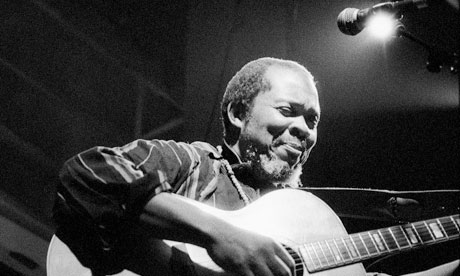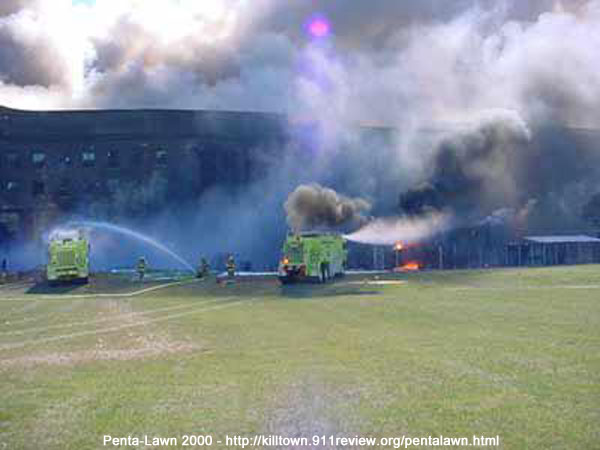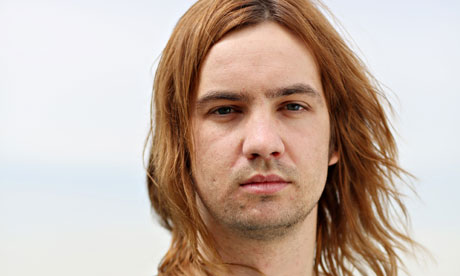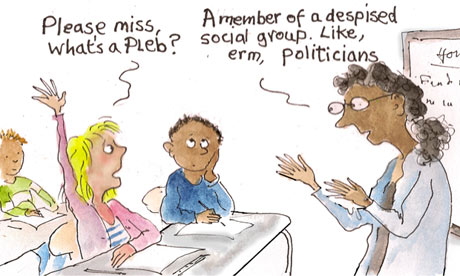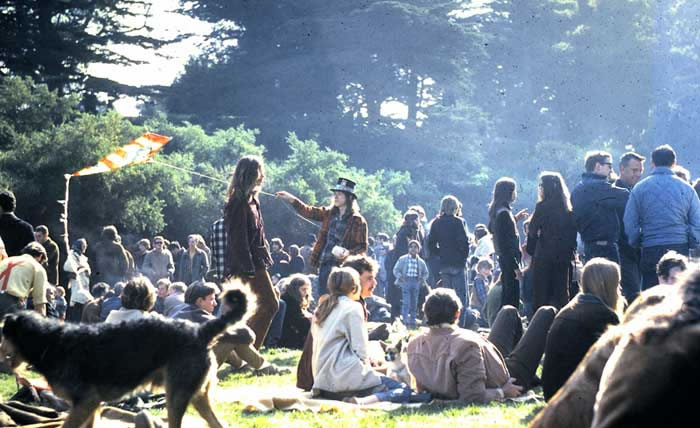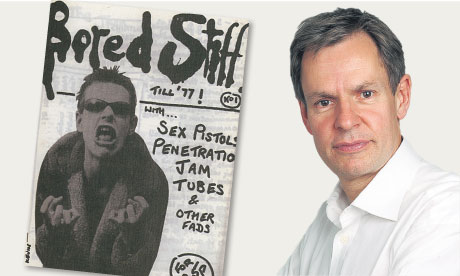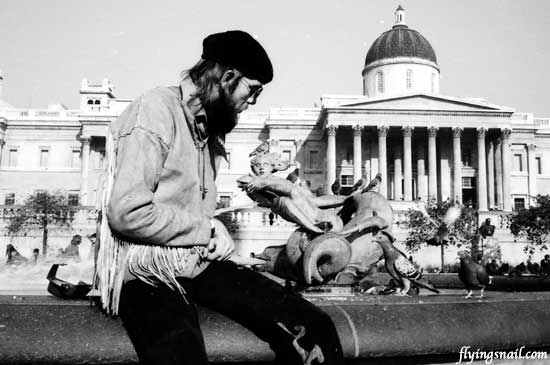
Tell-A-Vision = Why Not Try Love Again?
Notes from ~@~ Listed Below:
Terry Callier - You Goin' Miss Your CandymanTerry Callier obituary
Jazz, folk and soul musician with a string of influential albums, who was later taken up by Massive Attack and Beth Orton
Adam Sweeting, guardian.co.uk, Tuesday 30 October 2012 18.18 GMT, Article Source
Terry Callier at the Jazz Cafe in London in 2001. Photograph: David LeveneFrom his beginnings in jazz, folk and soul music onwards, the singer and guitarist Terry Callier, who has died aged 67 after suffering from throat cancer, struggled to find the popular recognition his varied talents deserved. Nonetheless he released a string of enduring and influential albums and, during the 1990s, enjoyed a creative rebirth in the UK when his supple, soulful music was feted by the acid-jazz movement and he collaborated with Beth Orton and Massive Attack.
Callier was born in Chicago and raised in the north side of the city. Partly inspired by his mother's enthusiasm for singers such as Ella Fitzgerald and Billie Holiday, he sang in amateur doo-wop groups in his teens, and found himself in the midst of a remarkable group of local musicians including Curtis Mayfield, Jerry Butler and Ramsey Lewis. In his teens, Callier signed with Chicago's renowned blues label Chess, and he released his debut single, Look at Me Now, in 1963.
The following year, he was signed to Prestige Records by the producer Samuel Charters, with whom he cut his first album, The New Folk Sound of Terry Callier. Featuring just an acoustic guitar, two bass players (an idea Callier borrowed from the jazzman John Coltrane) and Callier's gentle but hugely expressive voice, the album stands today as a minor masterpiece. However, it was not released until 1968 because in the meantime Charters had disappeared to Mexico, taking the master tapes with him.
Callier earned a living by playing gigs in New York and Chicago until he was contacted by Butler in 1970 and recruited to his salaried group of songwriters. "Our job was just to write songs and learn about the music business," Callier told the journalist Angus Batey. "That was incredible." The following year, the Chess producer Charles Stepney approached Callier for songs. Callier supplied The Love We Had (Stays On My Mind), which was recorded by the Dells and was successful enough to prompt a recording contract for Callier from the Chess subsidiary Cadet. He made three solo albums under Stepney's guidance: Occasional Rain, What Color Is Love and I Just Can't Help Myself; commercial reward did not match their critical acclaim and Cadet ended Callier's contract.
Hope was rekindled when Elektra Records came calling in 1977, though Callier refused to have any truck with the prevailing disco boom, and his two Elektra albums continued his string of commercial flops. His Elektra mentor, Don Mizell, quit the label in 1979, and Callier was dropped shortly afterwards.
When his daughter, Sundiata, who was living with Callier's ex-wife, told him she wanted to stay in Chicago to attend school, Callier realised he had to have a steady income. "She needed me and the music business just didn't seem like a viable option at that point," he said. He secured a staff job as a computer programmer at the University of Chicago, and relegated music to a mere hobby for the next decade and a half.
However, as the 90s dawned, Callier was amazed to be told that he had become an icon of the British soul-jazz scene, thanks to a single, I Don't Wanna See Myself (Without You), on an obscure label. This had caught the ear of cutting-edge DJs such as Eddie Piller, who dropped in on Callier in Chicago and invited him to perform at the 100 Club in London. His subsequent string of shows at the Jazz Cafe became legendary for the devotion he aroused in his listeners.
Callier sang two songs with Orton on her EP Best Bit and he was signed to Gilles Peterson's Talkin' Loud label, for which he cut the albums Timepeace (featuring Orton) and Lifetime, both suffused with a sense of faith and yearning for redemption. After his record deal collapsed following a round of record company mergers, the independent label Mr Bongo stepped into the breach and released the live album Alive and a studio album, Speak Your Peace, which featured a duet performed and co-written with Paul Weller.
Callier was sacked from his computer programmer's job and concentrated once more on music, dividing his time between the UK and the US. He recorded six acclaimed albums between 1999 and 2009. The last of these was Hidden Conversations, on which he was joined by Massive Attack, with whom he had collaborated on the single Live With Me, a Top 20 hit in 2006. "You can make accessible music and still sing about love and peace and truth and life and death," said Callier in 1996. "In the end, those are the only things that matter."
He is survived by his daughter.
• Terry Callier, musician, born 24 May 1945; died 28 October 2012
Nobody for President = NONE OF THE ABOVE should be on voter ballots
The real difference between Republicans and Democrats
Paul Krassner - The Realist/Writer/Comic/Investigative Satirist
via Paul Krassner:
Revolting News: Monday Night: Nobody for President Special
Greetings Tuli's Friends ( as Uncle Sam used to say ),
Tomorrow night, October 29, Monday, at 10 PM New York Time, Revolting News will present several of Tuli's performances of and discourses on "Nobody for President," " a political movement founded by our own Romney, Hugh Romney, aka "Wavy Gravy."
What do we need a president for, it asks, we may even be creating our own doom by putting so much power in the hands of one man, Tuli sez.
Clips from 1990s Revolting News and Coca Crystal shows, (slightly out of synch thanks to YouTube's distortion.)
So you don't miss this it's on Vimeo (already blogged and featured by MNN):
Should you want to watch on Cable TV the channels are:
Time Warner Cable- ch. 56
RCN Cable- ch. 83
Verizon FiOS- ch. 34Livestreamed on the net:
http://www.mnn.org/ watch now> ch. 2
Presidents have long been Tuli's favorite target. The last Revolting News Show he gave us, President's Night Part 2, ends with, "Please God, if there is a a God, abolish the presidency." He felt that strongly about it .
Nov. 8, 1976, Tuli published an assemblage of 50 Maxims in the Village Voice called "Good Morning, Mr. President"
Revoltingly, Thelma
Bic Pens for Women, TheEllenShow Channel
Notes from ~@~ Listed Below:
Memo to would-be journalists:
get your drone pilot's licenceRoy Greenslade, 29 October 2012, guardian.co.uk, Article Source
UNL's Drone Journalism Lab: Nebraska's Drought of 2012I know it's fashionable for publishers to cut back on staffing so I wonder what they think of this initiative: drone journalism.
The film above shows how a drone - more properly called an "unmanned aerial vehicle" - was used to cover this year's record drought in the US state of Nebraska.
And the film below shows the vehicle itself, and the ease with which its pilot is able to control it. So, to add to all those other skills modern journalists are now expected to have, expect "drone piloting" to feature on future CVs.
Drone journalism from the groundThe project, pioneered by Drone Journalism Lab, was discussed at a Reuters Institute for the Study of Journalism seminar last week.
As Judith Townend pointed out, there are wide-ranging possibilities for the use of drone journalism, such as the coverage of conflicts and environmental disasters, and also sports reporting.
But there are many potential problems too. Will there be objections from governments and consequent regulatory oversights? Will there be privacy issues? How should news outlets deal with third-party drone content?
Following the seminar, these questions will get an airing in a report from the Reuters Institute. I doubt that it will point out one obvious plus for publishers - the saving in reporters' expense accounts.
Sources: Judith Townend/Reuters Institute/YouTube and YouTube
Listening To Baseball On Radio Is More Fun
Than Watching It On FUX Television (IMO)
John Zacherle, The Cool Ghoul
On February 14, 1970 John Zacherle appeared at Fillmore East music hall in New York City to introduce rock act the Grateful Dead. His introduction of the band can be heard on the Grateful Dead album Dick's Picks Volume 4. + Zacherle Archives
Time For A Corporate Death Penalty
Title says: For a better start in life start cola earlier
Next to the soda bottle it says:
Promotes Active Lifestyle!
Boosts Personality!
Gives body essential sugars!Below the baby and woman it says:
How Soon Is Too Soon?
Not soon enough Laboratory tests over the last few years have proven that babies who start drinking soda during that early formative period have a much higher chance of gaining acceptance and "fitting in" during those awkward pre-teen and teen years. So, do yourself a favor. Do your child a favor. Start them on a strict regimen of sodas and other sugary carbonated beverages right now, for a lifetime of guaranteed happiness.
The Soda Pop Board of America
1515 W. Hart Ave - Chicago, IL
Radio Control Models - Aviation
Paranormal R/C Activity - Movie TrailerNotes from ~@~ Listed Below:
Ding Dong School, 1953
Boston Blackie, The Heist Job, 1953
Stakka Bo, Here we go again, 1993
ARPSN - Amateur Radio Public Seismic Network
Italian scientists jailed for 'false assurances' before earthquake
Manslaughter convictions handed down after people of L'Aquila received reassurances prior to earthquake that killed 300
John Hooper in Rome, The Guardian, Monday 22 October 2012 19.27 BST, Article Source
Seven of Italy's leading experts on natural disasters have each been sentenced
for giving false assurances before a 2009 earthquake Link to this videoAn Italian judge sent shockwaves through the scientific world on Monday when he sentenced seven of the country's leading experts on natural disasters to six years each for giving false assurances before the earthquake that hit the city of L'Aquila in 2009.
More than 300 people died after a 6.3-magnitude tremor hit the central Abruzzo region. The earthquake wrecked L'Aquila's historic centre, injured more than 1,000 people and left tens of thousands homeless.
The seven defendants, who belonged to the National Commission for the Forecast and Prevention of Major Risks, were accused of offering an unjustifiably optimistic assessment to the local population a week before the disaster. By then, the area had been hit by some 400 tremors over a period of four months and a local researcher had warned of the risk of a major earthquake, largely on the basis of abnormal radon emissions.
But after an extraordinary meeting of the commission in L'Aquila, one of the experts told a press conference that the situation was "normal" and even "favourable" because potentially destructive energy was being released through the tremors. The prosecution, which brought charges of multiple manslaughter, maintained that lives could have been saved had people not been persuaded by the assurances to remain in the area.
The sentences handed out by judge Marco Billi were higher than those demanded by the prosecution, which had asked for the accused to be given four years each. The judge also imposed lifetime bans from holding public office and ordered the defendants to pay compensation of €7.8m (£6.4m).
Marcello Petrelli, a lawyer for one of the experts, called the outcome of the trial "astounding and incomprehensible". In Italy, convictions are not considered definitive until after an appeal, so it is unlikely that any of the defendants will go to jail immediately.
But the sentences are expected to cause uproar among scientists worldwide. Several international bodies had warned that a guilty verdict could deter scientists from advising governments in future.
Enzo Boschi, the former president of Italy's National Institute for Geophysics and Volcanology, said he was "dejected and in despair". He said he had been convinced that he would be acquitted, "because I have never reassured anyone. I defy anyone to find in writing or speech, on television or elsewhere a reassurance by me concerning the Aquila earthquake."
Luciano Maiani, the incumbent president of the Major Risks Commission, said the verdict marked "the death of the services provided to the state by professors and professionals. It is impossible to supply the state with advice in a professional and composed way under this crazy judicial and media pressure. This does not happen in any other country in the world."
Giampaolo Giuliani, the researcher who became the "Cassandra" of the disaster after his warnings were ignored, said he had expected lighter sentences.
"I do not derive any pleasure [from the outcome]", Giuliani said. "No conviction can repay us for what happened."
Is Google a free speech opportunist?
By Jeff John Roberts, paidContent.org, Article Source
Rumors are swirling that the federal government is about to sue Google over claims that the company rigs its search results. Google has responded by invoking its right to free speech — but not everyone is buying this.
Tim Wu, a prominent law professor at Columbia, is not convinced that Google is invoking its First Amendment rights in good faith. He suggests that Google and other big companies are cynically invoking constitutional freedoms as part of a corporate deregulation agenda.
“We’re living in a golden age of First Amendment opportunism,” said Wu, speaking Friday at a Penn Law School conference titled “The Evolving Internet.”
In Wu’s view, search results are not really speech in the first space. Instead, he argues, Google’s algorithms are closer to other automated communication tools like navigation devices or even car alarms.
Google, of course, doesn’t share this view. The company prefers to be compared to a newspaper editor — whose choice of what to put in the paper is an undisputed free speech right. In practical terms, this means Google should be able to favor its own restaurant reviews over competing services like Yelp.
So who is right? Most of us would agree with Wu that Google’s search results fall somewhere in the middle of a communication continuum where the editor is on one end and the car alarm is on the other. The hard question is whether Google is far enough along the line to qualify for the First Amendment.
More broadly, this dilemma doesn’t apply just to Google. In the age of the algorithm, other companies may also rush to protect computer-based communication. Should Amazon, for instance, be allowed to argue that its product recommendation are a form of free speech?
The point here is that the choice of whether or not to sue Google is part of a larger process in which the country must decide where free speech stops and legitimate regulation begins.
Google - Zionist Engine Of Mind And Genetic Control ---- Google 'rigs' search results, rivals tell senators ---- Google’s Broken Promise: The End of “Don’t Be Evil” ---- Google Is Evil ---- Is Google Evil? ---- Don't be evil ---- Google Goes "Evil" ---- How evil is Google? Your Senators want to know. ---- Google Under Investigation for Being Evil ---- Google changed page rank on flyingsnail.com from 6 to 3, without regard to proper validation (which Google lacks), length of time online (flyingsnail = since January 1998), or creativity.
Israel Attacks U.S.S. Liberty
34 U.S. Military Dead, 171 Wounded
As Long As There Are Navy Veterans,

Israel's Attack on the USS Liberty will never go away !!!
Republicans and Democrats are Lying Hypocrites Who Support Selective Terrorism Against U.S. Military
No Justice, No Peace !!!
For the longest time we were fooled by traitor John McCain's fake patriotism, which was reinforced when the Republican Party turned against him in South Carolina; saying, he was a Manchurian Candidate, who fathered illegitimate children; some of which were African American, and was a homosexual with a drug addicted wife, etc.
What disturbs us the most about Republican John McCain is he Supported Israel's Attack on the U.S.S. Liberty:
Liberty Cover-Up and John McCain's Conscience
by William Hughes (Sunday, July 11, 2004)
"Sen. John McCain (R-AZ), a/k/a the “Conscience of the Senate,” has refused to support the rising call for a public Congressional hearing, with respect to Israel’s murderous attack on the USS Liberty, on June 8, 1967, that took the lives of 34 Americans. He insists the “matter was thoroughly reviewed” by a Naval Court of Inquiry, later in 1967. However, that inquiry was a whitewash. It’s time for McCain to right this wrong."
Sen. John McCain (R-AZ) is the “Conscience of the Senate.” Nevertheless, he won’t come clean about what really happened to the USS Liberty, at the hands of the Israelis, via napalm, gunfire, torpedoes and missiles, on June 8, 1967, 13 miles off the coast of the Sinai Peninsula McCain’s conscience, it seems, has its limits. I suspect it’s because the powerful Israeli Lobby weighs in so ominously in Washington, DC, protecting the interests of its favorite country - Israel - and making sure the mostly mousey congress people are kept totally in line or else (wrmea.com).
I wrote Sen. McCain, the “Conscience of the Senate,” back on March 8, 1997, pointing out to him that for “close to 30 years, the truth concerning Israel’s murderous attack on the USS Liberty has been covered-up...” I underscored for him that, “The conspiracy of silence concerning the Liberty must be ended now.” I urged him, “To stand up on the Senate floor and demand that Congress do its duty: investigate the Liberty affair...call all the survivors and all relevant witnesses to testify at a public hearing. Let justice, finally, be done for the fallen heroes of the Liberty.” (I found out later that one of the fallen heroes was Petty Office William B. Allenbaugh, a Baltimorean, who had graduated from my alma mater, Calvert Hall H.S.)
McCain declined my offer to raise his voice on behalf of the Liberty. He said that he wasn’t going to do anything about it because the “matter was thoroughly reviewed.” Really! In his letter to me, dated, April 28, 1997, he relied on the results of the now totally discredited Naval Court of Inquiry, which was conducted by Rear Admiral Isaac Kidd, USN. It began on June 10, 1967, and lasted less than a week. A scathing and devastating rebuttal of that seriously flawed Naval Inquiry can be found in the “Declaration,” dated Jan. 8, 2004, of Capt. Ward Boston, Jr., JAGC, USN (Ret). He was the senior legal counsel to the USS Liberty’s Court of Naval Inquiry (http://www.ifamericansknew.org/us_ints/ul-boston.html). Boston said that Admiral Kidd, the presiding officer of the Court, felt that the attack was “deliberate” and that the Israelis were “murderous b.......” Boston added that Kidd was pressured by the White House and the Defense Department to return a finding that the attack was a result of “mistaken identity.”
The unprovoked assault on the Liberty, which lasted 75 minutes, killed 34 brave Americans and wounded 172 others (“Assault on the Liberty,” James M. Ennes, Jr. and James Bamford’s “Body of Secrets”). The Israelis were trying to murder all 294 Americans on board the surveillance vessel, sink it, and make it look the Egyptians had done it (“Operation Cyanide,” Peter Hounam). The Israelis claimed it was “a mistake,” (See, Zionist Israel apologist’s Ahron Jay Cristol, “The Liberty Incident.” Cristol also smears those demanding justice in the Liberty matter as “conspiracy theorists.”)
Now, here’s the kicker: One of the Navy bigwigs pushing hard for a sanitized Liberty inquiry was none other than Sen. McCain’s father, Admiral John S. McCain, Jr., Commander-in-Chief, Naval Forces Europe. He wanted the investigation done in less than a week. Boston said a “proper inquiry would take at least six months.” Admiral McCain also wouldn’t permit Admiral Kidd to travel to Israel or to contact any potential Israelis witnesses. In fact, according to Boston, the written affidavits of 60 witnesses from the Liberty itself, who were hospitalized at the time of the restricted Inquiry, were also excluded from the final report and not considered as part of the evidentiary record. Boston is convinced, too, that the Israelis’ machine-gunning of the Liberty’s lifeboats, while the crew was trying desperately to assist their colleagues that were seriously wounded, was “a war crime.” Boston said higher ups wanted “to put a lid on everything” concerning the Liberty.
Many competent and authoritative responses have been made to all of the lame excuses raised by the Israelis and their sycophants. For compelling evidence, check out the books of Ennes, Bamford and Hounam cited above; also, go to the ussliberty.org site itself, and its related links. Terrence O’Keefe’s insightful, “The Myth of Thirteen Investigations,” at:
http://www.usslibertyinquiry.com/commentary/travesty/biglie.html
is a good place to start anyone’s education in a quest for the full truth, along with the excellent video, “USS Liberty Dead in the Water.”
So, McCain, the “Conscience of the Senate” wasn’t going to do anything about bringing justice to the Liberty! He did, however, say something else in his letter that made me feel suspicious about his do-nothing position. He said, “The attacking nation” did not submit any evidence or testimony on their behalf about the assault at the inquiry. “Attacking nation!” What is that suppose to mean? Why couldn’t McCain just come right out, he is the “Conscience of the Senate,” after all and simply say: The Israelis? Why use a deceptive term, like: “attacking nation?” Talk about Orwellian Double Speak! I can’t imagine McCain writing about the attack on U.S. forces at Pearl Harbor, on Dec. 7, 1941, and instead of stating up front that Japan was responsible, refer to that sneaky, militant aggressor as the “attacking nation.”
McCain may be known as the “Conscience of the Senate,” but considering the low reputation of that body, that’s not really saying much. I mean these are the same political weasels, led by that repulsive Sen. Joseph I. Lieberman (D-Ct), who passed the USA Patriot Act in the middle of the night, without any public hearing. Then, they gave away their Constitutional war-making power, under Art. 1, Sec. 8, to President George W. Bush, Jr., so he could lie us into the Iraqi conflict. And, while the country was still reeling from all of that, the Congress enacted the draconian Homeland Security Law. McCain participated in all three of these gross violations of the public trust, acting as a lap dog for the hawkish Lieberman.
Now, having said all of that, everyone knows that McCain is a genuine war hero. He spent 7 dreadful years as a Vietnam POW, under some horrific conditions. He was a naval pilot, who was shot down on a bombing run over that beleaguered country. Some POWs, however, seem like bigger, more celebrated heroes than others. I think it depends on your family, and PR connections, too, and also your propaganda value, if you know what I mean. For example, it didn’t hurt McCain that his dad and his grandfather were both admirals in the U.S. Navy.
Meanwhile, my old buddy from South Baltimore, Harry Agro, was a U.S. Navy guy, and a POW, too. He was a gunnery mate on merchant marine ships and survived two sinkings. Somebody should make a movie about Agro’s harrowing war time experiences. He spent close to 3 years in a Japanese POW camp, Hakodate, on the northern most island of Hokkaido, during WWII. The racist Japanese guards, (they hated Americans), beat Agro viciously just about every day of the week. They also worked him almost to death in their coal mines, while giving him little to eat. Harry’s father, a native of Sicily, unlike McCain’s, was a blue-collar worker. So, nobody has heard much about his son’s POW ordeal. McCain, yes. Agro, no. Even so, Agro will always be one of my personal heroes.
Finally, important and relevant disclosures have been made regarding the Liberty matter, since the “Conscience of the Senate” sent his half-baked letter to me on April 28, 1997. During this presidential election year, McCain will be making numerous campaign stops on behalf of the Bush-Cheney Gang. If you get a chance, ask him this question: “When are you going to stop covering-up about what really happened to the USS Liberty?”
McCain and Israel's Bombing of the U.S.S. Liberty
John McCain Confronted About USS Liberty Cover-up Memorial Day 2012
Phil Tourney USS Liberty Survivor Hosts the Officer Jack McLamb Show 05-28-2012
A Real Politician Would Attempt to Fix Israel's Atrocity !
Are there any Real Politicians Amongst us ?
The end of the New World Order
The upheavals of the early 21st century have changed our world. Now, in the aftermath of failed wars and economic disasters, pressure for a social alternative can only grow
Seumas Milne, The Guardian, Friday 19 October 2012 18.00 BST, Article Source
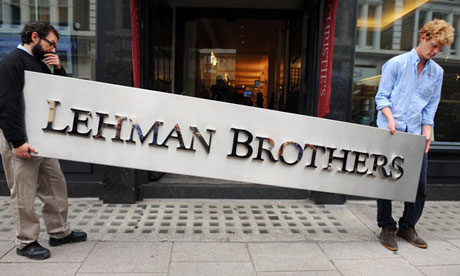
Culture shock ... the collapse of Lehman Brothers ushered in the deepest economic crisis
since the 1930s. Photograph: Linda Nylind for the Guardian
In the late summer of 2008, two events in quick succession signalled the end of the New World Order. In August, the US client state of Georgia was crushed in a brief but bloody war after it attacked Russian troops in the contested territory of South Ossetia.
The former Soviet republic was a favourite of Washington's neoconservatives. Its authoritarian president had been lobbying hard for Georgia to join Nato's eastward expansion. In an unblinking inversion of reality, US vice-president Dick Cheney denounced Russia's response as an act of "aggression" that "must not go unanswered". Fresh from unleashing a catastrophic war on Iraq, George Bush declared Russia's "invasion of a sovereign state" to be "unacceptable in the 21st century".
As the fighting ended, Bush warned Russia not to recognise South Ossetia's independence. Russia did exactly that, while US warships were reduced to sailing around the Black Sea. The conflict marked an international turning point. The US's bluff had been called, its military sway undermined by the war on terror, Iraq and Afghanistan. After two decades during which it bestrode the world like a colossus, the years of uncontested US power were over.
Three weeks later, a second, still more far-reaching event threatened the heart of the US-dominated global financial system. On 15 September, the credit crisis finally erupted in the collapse of America's fourth-largest investment bank. The bankruptcy of Lehman Brothers engulfed the western world in its deepest economic crisis since the 1930s.
The first decade of the 21st century shook the international order, turning the received wisdom of the global elites on its head – and 2008 was its watershed. With the end of the cold war, the great political and economic questions had all been settled, we were told. Liberal democracy and free-market capitalism had triumphed. Socialism had been consigned to history. Political controversy would now be confined to culture wars and tax-and-spend trade-offs.
In 1990, George Bush Senior had inaugurated a New World Order, based on uncontested US military supremacy and western economic dominance. This was to be a unipolar world without rivals. Regional powers would bend the knee to the new worldwide imperium. History itself, it was said, had come to an end.
But between the attack on the Twin Towers and the fall of Lehman Brothers, that global order had crumbled. Two factors were crucial. By the end of a decade of continuous warfare, the US had succeeded in exposing the limits, rather than the extent, of its military power. And the neoliberal capitalist model that had reigned supreme for a generation had crashed.
It was the reaction of the US to 9/11 that broke the sense of invincibility of the world's first truly global empire. The Bush administration's wildly miscalculated response turned the atrocities in New York and Washington into the most successful terror attack in history.
Not only did Bush's war fail on its own terms, spawning terrorists across the world, while its campaign of killings, torture and kidnapping discredited Western claims to be guardians of human rights. But the US-British invasions of Afghanistan and Iraq revealed the inability of the global behemoth to impose its will on subject peoples prepared to fight back. That became a strategic defeat for the US and its closest allies.
This passing of the unipolar moment was the first of four decisive changes that transformed the world – in some crucial ways for the better. The second was the fallout from the crash of 2008 and the crisis of the western-dominated capitalist order it unleashed, speeding up relative US decline.
This was a crisis made in America and deepened by the vast cost of its multiple wars. And its most devastating impact was on those economies whose elites had bought most enthusiastically into the neoliberal orthodoxy of deregulated financial markets and unfettered corporate power.
A voracious model of capitalism forced down the throats of the world as the only way to run a modern economy, at a cost of ballooning inequality and environmental degradation, had been discredited – and only rescued from collapse by the greatest state intervention in history. The baleful twins of neoconservatism and neoliberalism had been tried and tested to destruction.
The failure of both accelerated the rise of China, the third epoch-making change of the early 21st century. Not only did the country's dramatic growth take hundreds of millions out of poverty, but its state-driven investment model rode out the west's slump, making a mockery of market orthodoxy and creating a new centre of global power. That increased the freedom of manoeuvre for smaller states.
China's rise widened the space for the tide of progressive change that swept Latin America – the fourth global advance. Across the continent, socialist and social-democratic governments were propelled to power, attacking economic and racial injustice, building regional independence and taking back resources from corporate control. Two decades after we had been assured there could be no alternatives to neoliberal capitalism, Latin Americans were creating them.
These momentous changes came, of course, with huge costs and qualifications. The US will remain the overwhelmingly dominant military power for the foreseeable future; its partial defeats in Iraq and Afghanistan were paid for in death and destruction on a colossal scale; and multipolarity brings its own risks of conflict. The neoliberal model was discredited, but governments tried to refloat it through savage austerity programmes. China's success was bought at a high price in inequality, civil rights and environmental destruction. And Latin America's US-backed elites remained determined to reverse the social gains, as they succeeded in doing by violent coup in Honduras in 2009. Such contradictions also beset the revolutionary upheaval that engulfed the Arab world in 2010-11, sparking another shift of global proportions.
By then, Bush's war on terror had become such an embarrassment that the US government had to change its name to "overseas contingency operations". Iraq was almost universally acknowledged to have been a disaster, Afghanistan a doomed undertaking. But such chastened realism couldn't be further from how these campaigns were regarded in the western mainstream when they were first unleashed.
To return to what was routinely said by British and US politicians and their tame pundits in the aftermath of 9/11 is to be transported into a parallel universe of toxic fantasy. Every effort was made to discredit those who rejected the case for invasion and occupation – and would before long be comprehensively vindicated.
Michael Gove, now a Tory cabinet minister, poured vitriol on the Guardian for publishing a full debate on the attacks, denouncing it as a "Prada-Meinhof gang" of "fifth columnists". Rupert Murdoch's Sun damned those warning against war as "anti-American propagandists of the fascist left". When the Taliban regime was overthrown, Blair issued a triumphant condemnation of those (myself included) who had opposed the invasion of Afghanistan and war on terror. We had, he declared, "proved to be wrong".
A decade later, few could still doubt that it was Blair's government that had "proved to be wrong", with catastrophic consequences. The US and its allies would fail to subdue Afghanistan, critics predicted. The war on terror would itself spread terrorism. Ripping up civil rights would have dire consequences – and an occupation of Iraq would be a blood-drenched disaster.
The war party's "experts", such as the former "viceroy of Bosnia" Paddy Ashdown, derided warnings that invading Afghanistan would lead to a "long-drawn-out guerrilla campaign" as "fanciful". More than 10 years on, armed resistance was stronger than ever and the war had become the longest in American history.
It was a similar story in Iraq – though opposition had by then been given voice by millions on the streets. Those who stood against the invasion were still accused of being "appeasers". US defence secretary Donald Rumsfeld predicted the war would last six days. Most of the Anglo-American media expected resistance to collapse in short order. They were entirely wrong.
A new colonial-style occupation of Iraq would, I wrote in the first week of invasion, "face determined guerrilla resistance long after Saddam Hussein has gone" and the occupiers "be driven out". British troops did indeed face unrelenting attacks until they were forced out in 2009, as did US regular troops until they were withdrawn in 2011.
But it wasn't just on the war on terror that opponents of the New World Order were shown to be right and its cheerleaders to be talking calamitous nonsense. For 30 years, the west's elites insisted that only deregulated markets, privatisation and low taxes on the wealthy could deliver growth and prosperity.
Long before 2008, the "free market" model had been under fierce attack: neoliberalism was handing power to unaccountable banks and corporations, anti-corporate globalisation campaigners argued, fuelling poverty and social injustice and eviscerating democracy – and was both economically and ecologically unsustainable.
In contrast to New Labour politicians who claimed "boom and bust" to be a thing of the past, critics dismissed the idea that the capitalist trade cycle could be abolished as absurd. Deregulation, financialisation and the reckless promotion of debt-fuelled speculation would, in fact, lead to crisis.
The large majority of economists who predicted that the neoliberal model was heading for breakdown were, of course, on the left. So while in Britain the main political parties all backed "light-touch regulation" of finance, its opponents had long argued that City liberalisation threatened the wider economy.
Critics warned that privatising public services would cost more, drive down pay and conditions and fuel corruption. Which is exactly what happened. And in the European Union, where corporate privilege and market orthodoxy were embedded into treaty, the result was ruinous. The combination of liberalised banking with an undemocratic, lopsided and deflationary currency union that critics (on both left and right in this case) had always argued risked breaking apart was a disaster waiting to happen. The crash then provided the trigger.
The case against neoliberal capitalism had been overwhelmingly made on the left, as had opposition to the US-led wars of invasion and occupation. But it was strikingly slow to capitalise on its vindication over the central controversies of the era. Hardly surprising, perhaps, given the loss of confidence that flowed from the left's 20th-century defeats – including in its own social alternatives.
But driving home the lessons of these disasters was essential if they were not to be repeated. Even after Iraq and Afghanistan, the war on terror was pursued in civilian-slaughtering drone attacks from Pakistan to Somalia. The western powers played the decisive role in the overthrow of the Libyan regime – acting in the name of protecting civilians, who then died in their thousands in a Nato-escalated civil war, while conflict-wracked Syria was threatened with intervention and Iran with all-out attack.
And while neoliberalism had been discredited, western governments used the crisis to try to entrench it. Not only were jobs, pay and benefits cut as never before, but privatisation was extended still further. Being right was, of course, never going to be enough. What was needed was political and social pressure strong enough to turn the tables of power.
Revulsion against a discredited elite and its failed social and economic project steadily deepened after 2008. As the burden of the crisis was loaded on to the majority, the spread of protests, strikes and electoral upheavals demonstrated that pressure for real change had only just begun. Rejection of corporate power and greed had become the common sense of the age.
The historian Eric Hobsbawm described the crash of 2008 as a "sort of right-wing equivalent to the fall of the Berlin wall". It was commonly objected that after the implosion of communism and traditional social democracy, the left had no systemic alternative to offer. But no model ever came pre-cooked. All of them, from Soviet power and the Keynesian welfare state to Thatcherite-Reaganite neoliberalism, grew out of ideologically driven improvisation in specific historical circumstances.
The same would be true in the aftermath of the crisis of the neoliberal order, as the need to reconstruct a broken economy on a more democratic, egalitarian and rational basis began to dictate the shape of a sustainable alternative. Both the economic and ecological crisis demanded social ownership, public intervention and a shift of wealth and power. Real life was pushing in the direction of progressive solutions.
The upheavals of the first years of the 21st century opened up the possibility of a new kind of global order, and of genuine social and economic change. As communists learned in 1989, and the champions of capitalism discovered 20 years later, nothing is ever settled.
This is an edited extract from The Revenge of History: the Battle for the 21st Century by Seumas Milne, published by Verso. Buy it for £16 at guardianbookshop.co.uk
Martin Sheen and Woody Harrelson
set for 9/11 'truther' film September Morn
Film's advance publicity says: 'We the people demand an independent investigation into the tragic events of 9/11'
Rory Carroll in Los Angeles, guardian.co.uk, Wednesday 17 October 2012 22.28 BST, Article Source

Manhattan in the wake of the 9/11 attacks. Photograph: Reuters
Hollywood is to court controversy with a film that will challenge the official version of the events of 9/11, a previously taboo topic for the industry mainstream. Martin Sheen, Woody Harrelson and Ed Asner, who have all supported conspiracy theories about the terrorist attacks, have signed up to the movie, which is entitled September Morn.
Styling itself as a drama in the tradition of Twelve Angry Men, the film's advance publicity note hints at a cover-up, saying: "We the people demand that the government revisit and initiates a thorough and independent investigation to the tragic events of 911."
Why Didn't the Air Force Stop 9/11?
What Corporate Media Failed to Mention About 9/11:
[New Air Rules Were In Place After A Small Plane Crashed Into White House]CRASH AT THE WHITE HOUSE: THE OVERVIEW;
Unimpeded, Intruder Crashes Plane Into White House
[click for permalink]By MAUREEN DOWD,
Published: Tuesday, September 13, 1994Shortly before 2 A.M. today, a small red-and-white plane flew low over 17th Street in the heart of the capital's downtown, banked left in a U-turn near the Washington Monument, and headed straight toward the President's bedroom in the White House.
No one tried to stop it.
Administration officials, who pieced together the flight path, said that the Secret Service agents stationed outside the South Portico had only seconds to scramble out of the way as the two-seat, propeller-driven Cessna 150, its power apparently shut off and only its wing lights on, came straight at them.
Gliding over the treetops, the Cessna passed the fountain and the red cannas blooming on the South Lawn, bounced off the grass just short of the White House, crashed through the branches of a magnolia tree planted by Andrew Jackson and came to rest in a crumpled heap two stories below the Clintons' unoccupied bedroom.
President Clinton, Hillary Rodham Clinton and their daughter, Chelsea, were sleeping across Pennsylvania Avenue at Blair House, the guest house for visiting dignitaries, while repairs were being made to the ventilation system in the White House residence. The Clintons moved back into the White House today.
The authorities said the plane had been stolen and the pilot was Frank Eugene Corder, a 38-year-old truck driver from Maryland. His relatives said he had struggled with vertiginous moods, alcohol, a drug conviction, financial problems, the recent rupture of his third marriage and the death of his father.
Associates said that Mr. Corder, who was killed in the crash, even told a friend last year that he felt so hopeless he might fly a plane on a suicide mission to the White House. That could not be confirmed.
As the chilling sight of the crumpled airplane at the base of the mansion was beamed around the world, a debate began about whether White House security was lax.
Security officials said today that the plan for protecting the President against aerial attack relied more on moving him quickly to safety than on stopping the attack.
Secret Service officials, asserting that their shield around the President himself had not been penetrated, said their initial conclusion was that Mr. Corder was not trying to kill the President and appeared to have acted alone, though law-enforcement officials and several agencies would investigate.
Mr. Clinton was awakened at 2:35 A.M. by his chief of staff, Leon E. Panetta, who had been alerted to the 1:49 A.M. crash through a series of calls set in motion by a military aide who was sleeping in the basement of the White House residence, Lieut. Comdr. Richard Fitzpatrick. After being told of the crash, the President went back to sleep, aides said.
Mrs. Clinton returned to the family quarters this morning and watched from the Truman balcony above the diplomatic entrance as Secret Service agents, police officers and firefighters prowled the area, removing the wreckage, hosing away fuel and planting yellow flags to set off the gouge in the lawn left by the plane.
The South Lawn, where the Middle East peace pact was signed last year, was a remarkable sight today to those who had assumed that the White House had a sophisticated security system, with anti-aircraft guns and perhaps even rooftop missiles that could shield the mansion from an aerial intrusion, especially one so unsophisticated. Only 50 yards from the Oval Office, just around the corner from the Rose Garden, sat the tangle of metal, what was left of the plane's nose inches from the barred office window of the White House physician, Comdr. E. Connie Mariano, one floor below the State Dining Room. Near the Patio Furniture
The wreckage sat next to a set of white, wrought-iron patio furniture, across from the wide lawn where bleachers had been set up in anticipation of an afternoon ceremony today for the National Service plan, a ceremony that was moved. The cockpit was reminiscent of a crushed beer can, and the tail was tilted up, mostly intact. A tarpolin had been hung over the plane to conceal its identification numbers. A twisted brown aircraft seat rested in the dirt just left of the wreckage.
The scene was frightening proof of what military and security officials, planning against terrorist attacks, had long privately believed: that the White House is more vulnerable than anyone admits.
Judging from what happened today, either someone made a terrible security mistake or the integrity of the "secure" air space around downtown Washington -- one nautical mile on either side of the White House, extending up to 18,000 feet, and broadening to envelope the Mall, the Capitol and most of the area's well-known monuments and museums -- depends on intruders playing by the rules.
Passers-by can often see Secret Service agents walking on the White House roof or on duty in an observation post there. But experts said it would be dangerous to fire missiles in downtown Washington. A hit might send an aircraft crashing into a nearby landmark, like the Hay Adams Hotel or the Treasury Department. And, as a senior White House official noted today, "If you missed, E Street becomes pretty ugly, pal."
At a White House briefing this afternoon, a Secret Service official painted a picture of frantic activity and jittery uncertainty as the Cessna dropped quietly out of the night sky, landing without flame or fireball.
The official, Carl Meyer, said that agents had spotted the plane only after it completed its U-turn toward the White House and that they only had "enough time to run for cover."
Mr. Meyer added that he did not know if the Federal Aviation Administration's radar had detected the Cessna as it approached and violated the capital's restricted air space, saying that radar could probably not track a small aircraft flying at tree-top level, particularly if it was not using a standard electronic device that identifies the aircraft and enhances its image on radar screens.
Once the plane crashed, officials tried to determine whether the landing was an accident or part of an elaborate assassination attempt -- and whether the plane might still have explosives aboard.
"The first thing we had to determine was, what was the situation?" Mr. Meyer said. "Was this just a plane that ran out of gas? Did somebody have a heart attack? We just didn't have a good sense of what was involved here. Or, was it a diversion, was something going to come?"
Adolphus Roberts, an eyewitness who was on the mall and saw the plane approach from the north, over 17th Street, told investigators and reporters that the plane had flown near the Washington Monument and then made a left-hand turn toward the White House.
"It had lights on both wings, it turned left and lined up with the White House," he said. "I heard a large boom sound. There was no fire, no nothing." He said he heard no engine noise, suggesting that Mr. Corder may have cut his engine as he glided down toward the lawn.
By early morning, the wreckage was already a tourist attraction. No Plans 'Against a Lunatic'
Patrick Porter, 46, a software engineer for General Electric from Portland, Ore., looked at the South Lawn from behind yellow police tapes. "It just proves you can make all the plans in the world and there's nothing you can do to plan against a lunatic who doesn't think rationally," he said.
In Aberdeen, a small Maryland town 25 miles northeast of Baltimore, Mr. Corder's brother did not seem to know of any particular grudge that he might have held against Mr. Clinton. "Shock," said Mr. Corder's brother, John. "Surprise. It hit us right out of the blue."
After daylight, Mr. Clinton, wearing black jogging clothes and a baseball hat, returned to the White House and later peered out a window at the wreckage. Both he and his wife sought to play down the incident. In remarks by satellite to new members of his Americorps volunteer program, the President said that the White House "will be kept safe, and it will be kept open and the people's business will go on."
Mrs. Clinton told guests that it "has been quite an unusual day here at the White House."
Photos: Frank Eugene Corder, a trucker from Maryland, died when the small, single-engine plane he was piloting crashed on the South Lawn behind the White House early yesterday, the authorities said. He is shown in a 1993 photograph, above. At top, an investigator by the wreckage, just outside the Presidential private quarters, which were unoccupied at the time of the crash. (Photographs by Agence-France Presse (top), Associated Press (right) (pg. A1); Remnants of the plane that crashed near the White House's South Lawn being taken away yesterday. (Stephen Crowley/The New York Times) (pg. A20) Map/Diagram: "WHAT HAPPENED: The Crash at the White House" 1. Frank Eugene Corder stole a Cessna 150, a two-seat, single-engine airplane, from Hartford County Airpark, a private airport in Maryland, and took off after midnight yesterday. 2. He flew south toward Washington. 3. The plane entered the restricted flight zone at the center of Washington, near the White House. 4. After making a 180-degree turn west of the Washington Monument, Mr. Corder headed toward the White House. 5. The plane crashed at 1:49 A.M. on the South Lawn of the White House and skidded 50 feet along the ground into the wall two floors below President Clinton's bedroom; the Clintons were across the street at Blair House. Mr. Corder died in the crash. (Sources: Associated Press, Federal Aviation Administration) (pg. A20)
Crash at the White House - New York Times - 1994
Cheney Caught Ordering Air Force Standdown on 9/11
Cheney Caught Ordering Air Force Stand down on September 11, 2001.
http://www.9-11commission.gov/report/911Report_Ch1.htm. 9/11 Commission Report ...
www.welfarestate.com/wtc/cheney-911-coup.htm - 4k - Cached - Similar pagesThe "Stand Down" of the Air Force on 9/11
Jun 18, 2006 ... Why there was NOT a "stand down" order: explaining the "failure" of the Trillion Dollar Air Force to defend its headquarters ...
www.oilempire.us/standdown.html - 107k - Cached - Similar pagesCheney stand down order
[[the following Cheney stand down order is confused for a shoot down order]] ... Cheney stand down order { May 23 2003 } · Cheney told bush air force one is ...
newsmine.org/content.php?ol=9-11/norad-faa-response/cheney-stand-down-order.txt - 22k - Cached - Similar pagesWere Stand-Down Intercept Orders Given On Morning Of 911?
The Air Force spokesman confirmed that AFTER the alerts and requests for ... somewhere in the executive branch a STAND DOWN ORDER was issued --- to a pretty good ... about Bush having to make the decision to shoot down flight 77 on 9-11-01. .... Mr. Cheney is attempting to misinform by pretending that intercept ...
www.prisonplanet.com/were_stand_down_intercept_orders_given_on_morning_of_911.htm - 34k - Cached - Similar pagesNorman Mineta Confirms That Dick Cheney Ordered Stand Down on 9/11
New World Order ... Norman Mineta Confirms That Dick Cheney Ordered Stand Down on 9/11 ... "We had access, secured communications with Air Force One, ...
bushstole04.com/911/mineta_confirms.htm - 20k - Cached - Similar pagesNorman Mineta Confirms That Dick Cheney Ordered Stand Down on 9/11 ...
... text alongside him– that Mineta was indeed talking about a stand down order not to shoot down hijacked ... "We had access, secured communications with Air Force One, ...
hidhist.wordpress.com/terror/911/the-pentagon/norman-mineta-confirms-that-dick-cheney-ordered-stand-down-on-911/ - 90k - Cached - Similar pagesNorman Mineta Confirms That Dick Cheney Ordered Stand Down on 9/11 ...
The idea that "the order still stands" matches up with a change in NORAD and Pentagon ... "We had access, secured communications with Air Force One, ... the Vice President's role in ordering NORAD to stand down on 9/11. ...
muslimmedianetwork.com/mmn/?p=1111 - 45k - Cached - Similar pagesNorman Mineta Confirms That Dick Cheney Ordered Stand Down on 9/11
Mineta DOES NOT say that he heard Cheney order a stand down. ..... Cheney and Rumsfeld were putting the entire air force on drills that simulated attacks on ...
digg.com/world_news/Norman_Mineta_Confirms_That_Dick_Cheney_Ordered_Stand_Down_on_9_11 - 182k - Cached - Similar pagesMineta, Cheney and A the orders still stand @ controversy:
File Format: PDF/Adobe Acrobat - View as HTML
Further evidence that Vice President Cheney. = s order on 9/11 regarding .... accounts that Bush was airborne in Air Force One when shoot down order ...
www.journalof911studies.com/letters/OrderRegardingAA77HittingPentagonOn911.pdf - Similar pages9-11 Review: The 'Stand-Down Order'
The 'Stand-Down Order'. The shocking failure of the air defense system to .... The Vice-President (Cheney) is on record as approving the shooting down of ... Planes from Andrews Air Force base were in the sky "just minutes" after the ...
911review.com/means/standdown.html - 33k - Cached - Similar pagesPOWERFUL EVIDENCE AIR FORCE WAS MADE TO STAND DOWN ON 9-11
Jul 1, 2002 ... Vice President Cheney said on MEET THE PRESS September 16th that the FAA had open ... The bases did so under an order affecting major Army installations ...
www.emperors-clothes.com/indict/update630.htm - 26k - Cached - Similar pagesNorman Mineta Confirms That Dick Cheney Ordered Stand Down on 9/11
Jun 26, 2007 ... Alex Jones' American Dictators -- Order Now and let Your Friends and Family Know ... "We had access, secured communications with Air Force One, ... about the Vice President's role in ordering NORAD to stand down on 9/11. ...
www.infowars.com/articles/sept11/mineta_confirms_cheney_ordered_911_stand_down.htm - 23k - Cached - Similar pagesExposing NORAD's Wag The 911 Window Dressing Tale ...
NORAD says they actually waited till 9:24 a.m. to order Langley AFB to scramble. ..... 9:11 a.m.: The two F-15 Eagles from Otis Air National Guard station in Falmouth; ... 9:23 a.m.: Bush talks privately with Cheney, his National Security ..... Stand Down. The United States Air Force is the most technologically ...
standdown.net/ - 118k - Cached - Similar pagesJohn McQuaid: The Cheney Campaign
Haunted by the fact that 9-11 happened on his watch. Bush was in Florida, Cheney was in ... Why did he give the order for Norad to Stand Down? Why was our Air Force on manuevers in Canda? Why was he playing War Games on ...
www.huffingtonpost.com/john-mcquaid/the-cheney-campaign_b_206857.html - 189k - Cached - Similar pagesCheney Implicated 9/11
Andrews Air Force Base assigned to protect the Capital is 11 miles from ... However, According to General Meyers & Mineta, Cheney's stand down order ...
www.libertyforlife.com/eye-openers/cheny_implicated_911.html - 27k - Cached - Similar pagesDID CHENEY ALLOW OR ORDER 9/11 PLANE TO STRIKE PENTAGON
File Format: PDF/Adobe Acrobat - View as HTML
a.m., too late for him to authorize the Air Force to shoot it down. ... the 9/11 Commission implied that Cheney could not have given a stand- down order to ...
www.ericlarsen.net/FOOD%20FOR%20THOUGHT%207.1.2007.pdf - Similar pagesCheney's Bunker Mentality | Mother Jones
Cheney has been talking a lot about 9/11. So what was he doing that day? ... He said that the Air Force was trying to set up a combat air patrol (CAP) ..... We still don't know whether Cheney was issuing a Standdown order for Flt. 77 or ...
www.motherjones.com/politics/2009/05/cheneys-bunker-mentality - 120k - Cached - Similar pagesTim Russert, Dick Cheney, and 9/11
Jun 17, 2008 ... We had access, secured communications with Air Force One, ..... It makes clear that Cheney issued a shoot-down, not a stand-down, order. ...
www.globalresearch.ca/index.php?context=va&aid=9368 - 106k - Cached - Similar pagesThe Andrews Air Force Base Stand Down: How the ...
The Stratcom Stand Down on 9/11 · "Ringing Like Crazy": Were U.S. Military ... Cheney, Rumsfeld, and the Secret Government ... Andrews Air Force Base is located just 10 miles southeast of Washington, DC, .... He told the Secret Service agent, "I would feel more comfortable receiving such an order from someone ...
shoestring911.blogspot.com/2008/08/andrews-air-force-base-stand-down-how.html - 92k - Cached - Similar pagesCheney: Architect of 9/11? « Meltdown 2011
Posted on March 11, 2008 by Scott Gallup ... Obviously Cheney had not issued a shoot-down order but a stand-down order. ... and what was then an amazingly flatfooted response from our US Air Force. ...
meltdown2011.com/2008/03/11/cheney-architect-of-911/ - 48k - Cached - Similar pagesQUAKER TERRORISTS
The first accounts of DOMESTIC SPYING surfaced when Corporate Media reported:
Is the Pentagon spying on Americans?
Secret database obtained by NBC News tracks suspicious' domestic groups.By Lisa Myers, Douglas Pasternak, Rich Gardella and the NBC Investigative Unit
Updated: 6:18 p.m. ET Dec. 14, 2005WASHINGTON - A year ago, at a Quaker Meeting House in Lake Worth, Fla., a small group of activists met to plan a protest of military recruiting at local high schools. What they didn't know was that their meeting had come to the attention of the U.S. military.
A secret 400-page Defense Department document obtained by NBC News lists the Lake Worth meeting as a "threat" and one of more than 1,500 "suspicious incidents" across the country over a recent 10-month period.
"This peaceful, educationally oriented group being a threat is incredible," says Evy Grachow, a member of the Florida group called The Truth Project.
Continue reading at: http://www.msnbc.msn.com/id/10454316/
PEANUT-BUTTER and JELLY TERRORISTS
The Other Big Brother
The Pentagon has its own domestic spying program. Even its leaders say the outfit may have gone too far.
By Michael Isikoff, NewsweekJan. 30, 2006 issue - The demonstration seemed harmless enough. Late on a June afternoon in 2004, a motley group of about 10 peace activists showed up outside the Houston headquarters of Halliburton, the giant military contractor once headed by Vice President Dick Cheney. They were there to protest the corporation's supposed "war profiteering." The demonstrators wore papier-mache masks and handed out free peanut-butter-and-jelly sandwiches to Halliburton employees as they left work. The idea, according to organizer Scott Parkin, was to call attention to allegations that the company was overcharging on a food contract for troops in Iraq. "It was tongue-in-street political theater," Parkin says.
But that's not how the Pentagon saw it. To U.S. Army analysts at the top-secret Counterintelligence Field Activity (CIFA), the peanut-butter protest was regarded as a potential threat to national security.
Continue reading at: http://www.thedailybeast.com/newsweek/2006/01/29/the-other-big-brother.html
Bush Authorized Domestic Spying - Post-9/11 Order Bypassed Special Court
By Dan Eggen, Washington Post Staff Writer, Friday, December 16, 2005; Page A01President Bush signed a secret order in 2002 authorizing the National Security Agency to eavesdrop on U.S. citizens and foreign nationals in the United States, despite previous legal prohibitions against such domestic spying, sources with knowledge of the program said last night. Continue reading at:
http://www.washingtonpost.com/wp-dyn/content/article/2005/12/16/AR2005121600021.html
THE pRESIDENT: Yes, Ed.
Question: Mr. President, with this program, though, what can you say to those members of the public that are worried about violations of their privacy?
THE pRESIDENT: Ed, I can say that if somebody from al Qaeda is calling you, we'd like to know why. In the meantime, this program is conscious of people's civil liberties, as am I. This is a limited program designed to prevent attacks on the United States of America. And I repeat, limited. And it's limited to calls from outside the United States to calls within the United States. But they are of known -- numbers of known al Qaeda members or affiliates. I think most Americans understand the need to find out what the enemy is thinking. And that's what we're doing.
We're at war with a bunch of cold-blooded killers who will kill on a moment's notice. And I have a responsibility, obviously, to act within the law, which I am doing. It's a program that's been reviewed constantly by Justice Department officials, a program to which the Congress has been briefed, and a program that is, in my judgment, necessary to win this war and to protect the American people. Continue reading at:
http://www.whitehouse.gov/news/releases/2006/01/20060101.html - Link removed by the Republican Criminal Bush Administration
Details of the film, which is to be directed by BJ Davis and written by Howard Cohen, are expected to be revealed at an American Film Market conference in Los Angeles next week, Deadline.com reported.
The production has been set up by Fleur de Lis Film Studios, which has also made the documentary A Noble Lie, about the Oklahoma City bombing, and Operation: Dark Heart, a feature based on an intelligence agent's memoirs.
Until now Hollywood has steered clear of claims that the Bush administration, or other elements in the government, may have been behind the 9/11 attacks, in which hijacked passenger planes crashed into the Twin Towers of the World Trade Center, the Pentagon and a field in Pennslyvania. The fourth plane was apparently en route to the Capitol.
Did the Gas Station, 9/11, Pentagon, Video Tape Get Misplaced ???"Some eyewitnesses believe the plane actually hit the ground at the base of the Pentagon first, and then skidded into the building." - CBS
"...it didn't appear to crash into the building; most of the energy was dissipated in hitting the ground, but I saw the nose break up, I saw the wings fly forward, and then the conflagration engulfed everything in flames...But I think the blessing here might have been that the airplane hit before it hit the building, it hit the ground, and a lot of energy might have gone that way. That's what it appeared like." - CNN
"What -- or who -- caused Flight 77 to hit ground first, diffusing most of its destructive energy before it slammed into the Pentagon?" - ESPN/MSN
According to one witness, 'what looked like a 747' plowed into the south side of the Pentagon, possibly skipping through a heliport before it hit the building." - Stars and Stripes
Oliver Stone, who has challenged official history in JFK and other films, steered clear of conspiracy theories in his 2006 film World Trade Center, which focused on the heroism of police and rescuers.
September Morn has assembled a cast linked to the so-called truther movement, which alleges official inconsistencies, complicity and cover-up.
Ehud Barak, He came on the BBC with a prepared speech at the precise time of the attacks for an interview.
Sheen, who starred in Apocalypse Now and television's The West Wing, has long questioned whether Islamist hijackers single-handedly brought down the Twin Towers, killing 2,605 people.
"I did not want to believe that my government could possibly be involved in such a thing, I could not live in a country that I thought could do that – that would be the ultimate betrayal," he told an interviewer in 2007.
Sheen grew suspicious after his son Charlie, also an actor, alerted him to apparent contradictions, such as how a structure known as "Building 7" fell.

Building 7
He said: "However, there have been so many revelations that now I have my doubts, and chief among them is Building 7 – how did they rig that building so that it came down on the evening of the day?"
Asner, who has won seven Emmys, has several times urged a new investigation into 9/11. In 2010, he told an interviewer: "This country – which is the greatest, strongest country that ever existed in the world, in terms of power – supposedly had a defence that could not be penetrated all these years. But all of that was eradicated by 19 Saudi Arabians, supposedly. Some of whom didn't even know how to fly."
Republicans & Democrats are Lying Hypocrites
Who Support Selective Terrorism Against U.S. Military
Remember the U.S.S. Liberty:
34 U.S. Military Dead, 171 WoundedThe Assault on the USS Liberty Still Covered Up
By James M. Ennes Jr.
Washington Report On Middle East Affairs
June 1993, Page 19Twenty-six years have passed since that clear day on June 8, 1967 when Israel attacked the USS Liberty with aircraft and torpedo boats, killing 34 young men and wounding 171. The attack in international waters followed over nine hours of close surveillance. Israeli pilots circled the ship at low level 13 times on eight different occasions before attacking. Radio operators in Spain, Lebanon, Germany and aboard the ship itself all heard the pilots reporting to their headquarters that this was an American ship. They attacked anyway. And when the ship failed to sink, the Israeli government concocted an elaborate story to cover the crime.
There is no question that this attack on a U.S. Navy ship was deliberate. This was a coordinated effort involving air, sea, headquarters and commando forces attacking over a long period. It was not the "few rounds of misdirected fire" that Israel would have the world believe. Worse, the Israeli excuse is a gross and detailed fabrication that disagrees entirely with the eyewitness recollections of survivors. Key American leaders call the attack deliberate. More important, eyewitness participants from the Israeli side have told survivors that they knew they were attacking an American ship. [Click to Continue Reading]
Harrelson, who starred recently in The Hunger Games, has also supported the self-styled 9/11 truth movement.
September Morn is also the name of a Neil Diamond album and a painting by the French artist Paul Émile Chabas which hangs in New York's Metropolitan Musuem of Art.
Democracy Prep Citizen-Scholars: Vote for Somebody
Notes from ~@~ Listed Below:
Tame Impala
Tame Impala - ExpectationTame Impala: a trip inside the head of main man Kevin Parker
The Aussie band's second album Lonerism is one of the year's best rock records – so why is the musical obsessive behind it all still plagued by self doubt?
Nosheen Iqbal, The Guardian, Friday 5 October 2012, Article Source
Lonerism island: Kevin Parker AKA Tame Impala. Photograph: Dorothy Hong for the GuardianDig if you will, as Prince once suggested, the picture: it's the fag-end of summer on a quiet Friday night in Paris. I'm eating dinner outside a twee neighbourhood restaurant – brusque waiter and French accordion jazz coming as standard issue – with Kevin Parker. The 26-year-old Australian frontman (well, everything man) of Tame Impala is about to release one of the autumn's most talked-about albums in Lonerism, the follow-up to 2010's slow-burning but addictive Innerspeaker.
If that debut was a classic wedge of psychedelic stoner pop, its fuzzy logic burbling through the speakers, then Lonerism seems to be Parker's own Electric Kool Aid Acid Test: a journey of songs in delirious, kaleidoscopic Technicolor, with trippy paranoia seeping through Why Won't They Talk To Me?, Apocalypse Dreams and the mantra-like insistence of album opener Be Above It.
"I'm always surprised whenever someone tells me Tame Impala reminds them of getting blazed. I never think my own music is druggy at all," says Parker, considering his sound's synthesthetic appeal. "Sometimes it helps. I don't wanna say it's a requirement. For me, it's like doing high jump at an athletics carnival: if you can do it without drugs, that's good. If you can get higher with drugs, that's great. But if you need drugs to get to that bar in the first place, that's not right. It should be in you regardless. People's imaginations and dreams are more fucked-up than drugs; it's just the sound of music in my head."
If that's the case, the inside of Parker's mind is a brilliantly warped pop boggle. Listen to Tame Impala and watch them play live, and you could be forgiven for thinking this was your holy grail of a rock'n'roll band, built on a foundation of epic living and excess, bonded through the supersize psych-rock jams they've made their calling card. The truth, however, is that this five-piece are just a front, the touring cover for a solo project orchestrated from Parker's bedroom. A self-proclaimed loner, he composes and records every layer of sound on his songs before calling on his mates – who are all in other Perth bands – to play out their respective parts. They're there to beef up the live shows, and to stop Parker from getting locked in his own head.
Tame Impala - ElephantReading this on mobile? Click here to view
"[Lonerism] almost drove me insane. In fact, it pretty much did; it was two agonising years, one in Perth, one in Paris," says Parker, explaining that songs come relatively quickly to him: "Without wanting to sound like I'm some fucking spiritual being, they come in flashes." But that's then followed by an extended process in which he tinkers with them relentlessly, stuck in a vicious cycle of insecurity. "I'd have the idea and do most of the song in about a night and spend the next two years listening to it over and over," he says. "I'd cycle through different drum sounds, different guitar sounds, do a lot of pointless stuff. Not a lot changes, that's the fucking crucifying thing."
Dressed in faded jeans and an adorably dweeby cardigan, his surfer hair in a centre-parting, Parker looks like the bastard child of Kurt Cobain and Joan Baez. Previous interviews have suggested he's incredibly shy or obtuse. In person, he's neither; he's funny, introspective and honest.
Reflecting on his hyper-sensitivity and self-doubt (surely, the twin engines powering all tortured artists), Parker is thoughtful, but mostly relieved to have reached the finishing line with a new set of songs. "If you don't have anyone to talk to at the time, it grows into a massive beast ricocheting inside your head," he says. "You have no way of stopping it when it's just you making the music. A bad thought can spiral and you can get so depressed you just think you're worthless. There were times recording this album that I thought, 'This the worst fucking thing I've ever heard in my life.'" There's an awkward pause, which I almost jump to fill with hurried reassurance, before he cracks a grin: "Conversely, sometimes I listen to it and think it's the best thing ever."
'There were times recording this album that I thought: 'This the worst fucking thing I've ever heard in my life'
Kevin Parker onstage in Lorne, Australia, 2010. Photograph: Zak Kaczmarek/WireImageParker's parents split up when he was young. "My mum was quite poor and my dad was rich. She didn't dig that so she left him," he says. Parker moved with his mum, while his older brother stayed with his dad: "She was creative, he was an accountant. But a closet musician at heart."
There were always instruments at his dad's house and tons of records – Supertramp, the Shadows, the Beatles, the Beach Boys – all of which shaped his early tastes. Eventually, he moved in with his dad, brother and step-brother: "Mum was starting to freak me out changing through boyfriends quite a lot and I was slightly intimidated. I wanted to become part of the dad scene, living near the beach and stuff."
So he learned the drums and guitar and accelerated through a whole rebellion of skunk, booze, shoplifting and being sent home in a police car, all by the time he was 13. He went to an expensive, private Catholic high school where he met Dom (his closest friend and guitarist in Tame Impala), though Parker's dad ("a square") made sure he enrolled in an engineering degree at university. Somewhere in between, after more than a decade of divorce, his parents got back together: "Yeah, for two months. It was weird. Then exciting. Then tragic."
Parker switched courses to astronomy, but skipped pretty much every lecture. He spent a year working for a law firm, obliviously serving papers to people across the city ("I loved it cos I just got to walk around all day in total solitude all week"), and then later, in an off-licence, so he could concentrate better on making music. "I was always putting songs on the internet," he says, supposing they're still there, "but I was never into pushing them on anyone." Eventually, he found himself in the middle of Perth's tiny collective of "musos" where "the idea of [making music] to please someone else is really kind of taboo".
It's a tight-knit scene; most of Tame Impala met through the apparently notorious Troy Terrace, Parker's home in the city for four years, and the base for their first collaboration as Mink Mussel Creek. Troy Terrace was, he says, "a total pit, with broken instruments and recording equipment in every single room". Bands such as Space Lime Peacock and Rabbit Island also formed via Perth's unofficial indie HQ as, in the grand tradition of rock mythology, "the door was always open, there was always something obscure playing and a spliff being passed around." Downstairs, they got wasted and jammed; upstairs Parker worked on his solo stuff on an eight-track, in the same way he'd been doing it since he was 13.
'The guys I play live with have always had their own bands and been busy with that. Each band we're involved with is one part of the puzzle'
Tame Impala onstage in New York City, 2010. Photograph: Cory Schwartz/GettyGiven the level of absolute control he's used to, it's no surprise that Parker has no real interest in making Tame Impala more collaborative. "The guys are so cool with it because they've always had their own bands and been busy with that," he says. "Each band we're involved with is just one part of the puzzle." A recent-ish addition to the Perth circle is Melody's Echo Chamber, the deservedly hyped shoegazey French-pop stylings of Melody Pinochet, Parker's girlfriend. The pair met in Paris a couple of years ago and though their relationship is the only thing he is reluctant to talk about, Parker has produced her debut album (released in the UK on Weird World on 5 Nov), with the rest of the band helping record the tracks she had written.
Whichever way Parker cuts it (and his default setting is to modestly downplay), the next few months mark a hugely exciting moment in Tame Impala's transition from bedroom to sell-out tour success. He jokes about having written "seven or eight" songs for Kylie if she'll have them. If Minogue's management have any sense, they'll be knocking his door down. Noels Gallagher and Fielding have raved about the live shows, and Parker is pleased that the Flaming Lips and Mark Ronson like the band but insists, "I'm not really into that." Instead, Parker's pleasures are simple: riding around Paris on a bike, sitting on a beach in Perth, or watching Futurama. "This is where you work out how uncultured and uneducated I really am!" he laughs. Given his dreamer-like disposition and knack for self-criticism, I'm curious about how much he's enjoying doing what he's always wanted. Is being Tame Impala everything he expected? "Sure! I'm in Paris, drinking a beer, talking about myself for hours. Sure. I'd be a fool to complain."
Tame Impala tour the UK from 30 Oct
Way out west
More leading lights from Perth's incestuous psych-rock scene
POND Riotously ragged 1960s-meets-90s psych-pop from a band who share several members with Tame Impala, including drummer Jay Watson. Their recent album Beard Wives Denim is one of 2012's most enjoyable freak-outs.
CANYONS Electro duo who released the early Tame Impala EP Lovemore on their own label, Hole In The Sky. Kevin Parker repaid the favour by contributing vocals to Canyons' 2011 album Keep Your Dreams.
GUM Spacey and wistful new band fronted by Tame Impala and Pond's Jay Watson. Their debut album Delorean Highway is due out early next year.
RABBIT ISLAND Woozy, acoustic solo project of Perth's Amber Fresh, also featuring guest appearances from members of – you've guessed it – Tame Impala and Pond.
Winky Dink and You
Mr. WizardRadio Control Models - Aviation
Ghost Quadcopter
LET'S TALK ABOUT TORTURE
Who Was Responsible for Instituting Torture in the United States?
It Was: Stanford [War Criminal] Condoleezza Rice
Rice gave early approval for CIA waterboarding,
Senate report reveals
• Go-ahead in July 2002 is first known official approval
• Finding suggests greater Rice role than she admitted
Ewen MacAskill in Washington, Stephen Bates and agencies, guardian.co.uk, Thursday 23 April 2009 07.27 EDT, Article history, Article Source
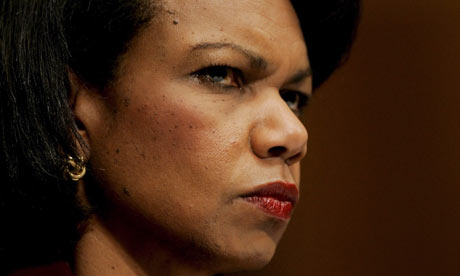
Condoleezza Rice: gave the first known official approval of waterboarding,
Senate report claims. Photograph: Stefan Zaklin/EPA
Condoleezza Rice gave permission for the CIA to use waterboarding techniques on the alleged al-Qaida terrorist Abu Zubaydah as early as July 2002, the first known official approval for the technique, according to a report released by the Senate intelligence committee yesterday.
The revelation indicates that Rice, who at the time was national security adviser and went on to be secretary of state, played a greater role than she admitted in written testimony last autumn.
The committee's narrative report (pdf) also shows that dissenting legal views about the interrogation methods were brushed aside repeatedly. The mood within the Bush administration at the time is caught in a handwritten note attached to a December 2002 memo from Donald Rumsfeld, the then defence secretary, on the use of stress positions. "I stand for 8-10 hours a day. Why is standing limited to 4 hours?" he asked.
The intelligence committee's timeline comes a day after the Senate armed services committee released an exhaustive report detailing direct links between the harsh interrogation programme of the CIA and abuses of prisoners at the US prison at Guantánamo Bay in Cuba, in Afghanistan and at Iraq's Abu Ghraib prison.
The latest report, which compiles legal advice provided by the Bush administration to the CIA, indicates that Rice personally conveyed the administration's approval for waterboarding Zubaydah to the then CIA director, George Tenet, in July 2002.
Last autumn, Rice acknowledged to the armed services committee only that she had attended meetings where the CIA interrogation request was discussed. She said she did not recall details. Within days, the justice department secretly approved the use of waterboarding. Zubaydah underwent waterboarding at least 83 times in August 2002.
In the years that followed, according to yesterday's report, there were numerous internal legal reviews, suggesting government lawyers were concerned that methods such as waterboarding might violate federal laws against torture and the US constitution. Bush administration lawyers continued to validate the programme, but the CIA voluntarily dropped the use of waterboarding after 2005.
The 232-page armed services committee report, the most detailed investigation yet into the background of torture, undercut the claim of the then deputy defence secretary, Paul Wolfowitz, that the abuse of prisoners in Iraq was the work of "a few bad apples".
Its release yesterday added to the debate raging within the US after President Barack Obama, who regards the techniques as torture, opened the way for possible prosecution of members of the Bush administration.
Carl Levin, the Democratic chairman of the committee, said: "The paper trail on abuse leads to top civilian leaders, and our report connects the dots." The report shows a paper trail going from Rumsfeld to Guantánamo to Afghanistan and to Iraq.
The report says: "The abuse of detainees in US custody cannot simply be attributed to the actions of "a few bad apples" acting on their own. The fact is that senior officials in the United States government solicited information on how to use aggressive techniques, redefined the law to create the appearance of their legality, and authorised their use against detainees."
The report, the result of an 18-month inquiry, revealed that the administration rejected advice from various branches of the armed services against using more aggressive techniques. The military questioned the morality and the reliability of information gained.
The report condemned the techniques adopted, saying: "Those efforts damaged our ability to collect accurate intelligence that could save lives, strengthened the hand of our enemies, and compromised our moral authority."
The report disclosed that waterboarding and other techniques used were based on a faulty premise. The methods were lifted from a military programme known as Survival Evasion Resistance and Escape, but the armed forces pointed out this was intended to train troops in resisting torture during the Korean war, rather than establishing whether these were useful interrogation methods.
A New York Times report says that, even then, it was appreciated that the techniques induced false confessions from the American personnel on which it was tried. The paper adds that the US prosecuted torturers who employed waterboarding in war crimes trials following the second world war and that it was a technique known to have been used by despots including Pol Pot in Cambodia.
The New York Times says administration officials briefed by Tenet were not aware that the former military psychologist who played a central role in persuading the CIA to use waterboarding had never conducted a real interrogation and that the justice department lawyer most responsible for declaring the method legal had "idiosyncratic ideas" that the department would later renounce.
Bush administration memos released by Obama last week were confined to interrogations at Guantánamo and CIA secret prisons around the world, but the Senate report goes wider, including prisons run by the US military in Iraq and Afghanistan.
Murdering & Maiming Women & Children
Is A Big Joke To Republicans and Democrats:
On October 3, 2000 War Criminal and Liar George W. Bush said: If we don't have a clear vision of the military, if we don't stop extending our troops all around the world and nation building missions, then we're going to have a serious problem coming down the road, and I'm going to prevent that.

Martin Rowson cartoon of War Criminal Rice saying "Isn't democracy wonderful?"
Bush-Cheney CIA/Plame case indictments released this morning
Bush orders Fitzgerald fired and espionage indictments quashed
by Tom Flocco Washington, DC == October 21, 2005 == 12:00 EST
Today Special Counsel Patrick Fitzgerald handed over 22 indictments to Attorney General Alberto Gonzalez, accusing President George W. Bush, Vice President Richard Cheney and others of espionage, obstruction of justice, perjury and a variety of other charges in the matter of the CIA/Valerie Plame leak-gate case. [click to continue reading]
Nobody Has All the Answers and Should Be President

Samuel R. Caldwell - America's First Victim of Marijuana Prohibition - Arrested October 5, 1937
Decriminalise drug use, say experts after six-year study
Advisors say no serious rise in consumption is likely if possession of small amounts of controlled drugs is allowed
Alan Travis, home affairs editor The Guardian, Monday 15 October 2012, Article Source
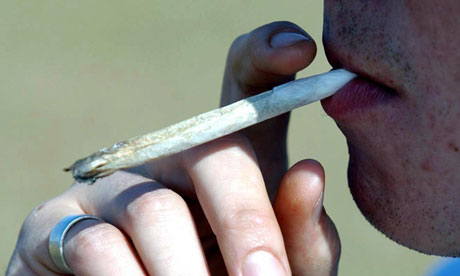
A review of the government's appraoch to cannabis and other drugs is needed,
says the independent body that analyses drug laws Photograph: PA
A six-year study of Britain's drug laws by leading scientists, police officers, academics and experts has concluded it is time to introduce decriminalisation.
The report by the UK Drug Policy Commission (UKDPC), an independent advisory body, says possession of small amounts of controlled drugs should no longer be a criminal offence and concludes the move will not lead to a significant increase in use.
The experts say the criminal sanctions imposed on the 42,000 people sentenced each year for possession of all drugs – and the 160,000 given cannabis warnings – should be replaced with simple civil penalties such as a fine, attendance at a drug awareness session or a referral to a drug treatment programme.
They also say that imposing minimal or no sanctions on those growing cannabis for personal use could go some way to undermining the burgeoning illicit cannabis factories controlled by organised crime.
But their report rejects any more radical move to legalisation, saying that allowing the legal sale of drugs such as heroin or cocaine could cause more damage than the existing drugs trade.
The commission is chaired by Dame Ruth Runciman with a membership that includes the former head of the British Medical Research Council, Prof Colin Blakemore, and the former chief inspector of constabulary, David Blakey.
The report says their analysis of the evidence shows that existing drugs policies struggle to make an impact and, in some cases, may make the problem worse.
The work of the commission is the first major independent report on drugs policy since the influential Police Foundation report 12 years ago called for an end to the jailing of those possessing cannabis.
The UKDPC's membership also includes Prof John Strang, head of the National Addictions Centre, Prof Alan Maynard, a specialist in health economics, and Lady Ilora Finlay, a past president of the Royal Society of Medicine.
The report says that although levels of illicit drug use in Britain have declined in recent years, they are still much higher than in many other countries. The UK has 2,000 drug-related deaths each year and more than 380,000 problem drug users.
The 173-page report concludes: "Taking drugs does not always cause problems, but this is rarely acknowledged by policymakers. In fact most users do not experience significant problems, and there is some evidence that drug use can have benefits in some circumstances."
The commission's radical critique says the current UK approach is simplistic in seeing all drug use as problematic, fails to recognise that entrenched drug problems are linked to inequality and social exclusion, and that separating drugs from alcohol and tobacco use makes it more difficult to tackle the full range of an individual's substance use.
It says the £3bn a year spent tackling illegal drugs is not based on any evidence of what works, with much of the money wasted on policies that are not cost-effective.
It argues that even large-scale seizures by the police often have little or no sustained impact on the supply of drugs; that Just Say No campaigns in schools sometimes actually lead to more young people using drugs; and that pushing some users to become abstinent too quickly can lead to a greater chance of relapse or overdose and death.
The commission argues a fresh approach based on the available evidence should be tested. Its main proposals include:
• Changing drug laws so that possession of small amounts of drugs for personal use would be a civil rather than criminal offence. This would start with cannabis and, if an evaluation showed no substantial negative impacts, move on to other drugs. The experience of Portugal and the Czech Republic shows that drug use would not increase and resources can be directed to treating addiction and tackling organised crime.
• Reviewing sentencing practice so that those caught growing below a specified low volume of cannabis plants faced no, or only minimal, sanctions. But the production and supply of most drugs should remain illegal.
• Reviewing the level of penalties applied against those involved in production and supply, as there is little evidence to show that the clear upward drift in the length of prison sentences in recent years has proved a deterrent or had any long-term impact on drug supply in Britain.
• Reviewing the 1971 Misuse of Drugs Act so that technical decisions about the classification of individual drugs are no longer taken by the Advisory Council on the Misuse of Drugs (ACMD) or politicians but instead by an independent body with parliamentary oversight.
• Setting up a cross-party forum including the three main political party leaders to forge the political consensus needed to push through such a radical change in approach.
Blakemore said: "Medicine has moved past the age when we treated disease on the basis of hunches and received wisdom. The overwhelming consensus now is that it is unethical, inefficient and dangerous to use untested and unvalidated methods of treatment and prevention. It is time that policy on illicit drug use starts taking evidence seriously as well."
Blakey, who is also a former president of the Association of Chief Police Officers (Acpo), said the current approach of police taking action against people using drugs was expensive and did not appear to bring much benefit. "When other countries have reduced sanctions for low-level drug users, they have found it possible to keep a lid on drug use while helping people with drug problems to get into treatment," the former chief constable said. "But at the same time, we need to continue to bear down on those producing and supplying illicit drugs. This is particularly important for those spreading misery in local communities."
Runciman said government programmes had done much to reduce the damage caused by the drug problem over the past 30 years, with needle exchanges reducing HIV among injecting drug users and treatment programmes which had helped many to rebuild their lives. The commission's chair said: "Those programmes are supported by evidence, but much of the rest of drug policy does not have an adequate evidence base. We spend billions of pounds every year without being sure of what difference much of it makes."
The home secretary, Theresa May, last month ruled out any moves towards decriminalisation, saying it would lead to further problems.
She told MPs she considered cannabis a gateway drug: "People can die as a result of taking drugs, and significant mental health problems can arise as a result of taking drugs."
Student societies: standing up for the nerds
Over the past few weeks bloggers have written about why their student society is the best. Today, Emma James says why subject-based societies are worth your time
Posted by Emma James Monday 15 October 2012 10.46 BST, guardian.co.uk, Article Source

There's more to your subject than exam revision and 9am lectures. Photograph: Sebastian Kaulitzki/Alamy
Unfortunately it's just not possible to juggle the drama society with ju-jitsu, the student paper and football. After joining far too many groups at freshers fair, most first-year students will now be culling their student society commitments. And for many, subject-based societies will be the first to go.
If you're studying a maths BA, why bother signing up to maths society? You'll be doing a fair bit of academic study already, you don't want to come across as too nerdy.
Actually, after spending a year heading my university's psychology society, and studying the subject full-time at undergraduate level, I found that subject-based societies are the most underrated of all. Here's why.
1. Most people at university are committed to their subject and want to pursue it further – or, they are until the first essay crises kick in, anyway. Subject-based societies are a great way to meet people who share your interest and reawaken the enthusiasm you had for your field in the pre-Ucas days.
2. Your society will be there for the lows as well as the highs. Bond over your mutual sense of desperation when faced with end-of-term exams. They offer a chance to share your suffering.
3. Membership doesn't come with the same time commitments as a sports club. You can go to the events you want to but don't have to worry about letting the side down when life gets too hectic.
4. It's all in aid of your degree, so any time you do spend there is guilt-free – although, admittedly, free cocktails mean conversations don't always centre around coursework.
5. Most groups also put on talks featuring big-name academics. Unlike your usual lecturers they don't demand your attention at 9am after a big night out – and their talks usually veer outside the mainstream topics you cover on your course syllabus. The psychology of face transplantation certainly wasn't something I was expecting to pop up in my part-finals, but it was refreshing to be able to enjoy a talk on the subject without the pressure of having to learn every detail mentioned.
6. But, events aren't just for those who hope to pursue their subject beyond undergraduate level. Most societies also put on events to show the range of career options that are available to members after graduation. The society I attend has had plenty of sessions discussing the typical career choices followed by psychologists, but it has also hosted more unusual sessions, including a seminar in science writing.
If you haven't found a society for your subject at university, then why not start one up? Take your academic interests outside the lecture hall, build your own curriculum and make friends.
A letter to my dismal allies on the US left
Please, radical leftists, spare us the bitterness and negativity; we need hope and incremental victories and you provide neither
Rebecca Solnit for TomDispatch, part of the Guardian Comment Network, guardian.co.uk, Monday 15 October 2012 12.00 BST, Article Source
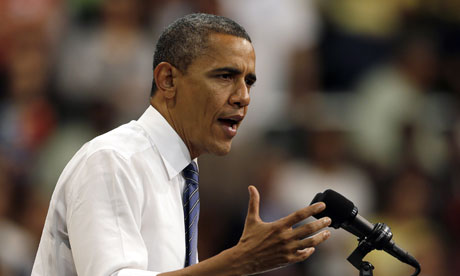
'You could argue that to vote for Barack Obama is to vote for the killing of children, or to vote for
the protection for other children or even killing fewer children. Virtually all US presidents have called
down death upon their fellow human beings. It is an immoral system.' Photograph: Lynne Sladky/AP
Dear allies,
Forgive me if I briefly take my eyes off the prize to brush away some flies, but the buzzing has gone on for some time. I have a grand goal, and that is to counter the Republican right with its deep desire to annihilate everything I love and to move toward far more radical goals than the Democrats ever truly support. In the course of pursuing that, however, I've come up against the habits of my presumed allies again and again.
O rancid sector of the far left, please stop your grousing! Compared to you, Eeyore sounds like a Teletubby. If I gave you a pony, you would not only be furious that not everyone has a pony, but you would pick on the pony for not being radical enough until it wept big, sad, hot pony tears. Because what we're talking about here is not an analysis, a strategy, or a cosmology, but an attitude, and one that is poisoning us. Not just me, but you, us, and our possibilities.
Leftists explain things to me
The poison often emerges around electoral politics. Look, Barack Obama does bad things and I deplore them, though not with a lot of fuss, since they're hardly a surprise. He sometimes also does not-bad things, and I sometimes mention them in passing, and mentioning them does not negate the reality of the bad things.
The same has been true of other politicians: the recent governor of my state, Arnold Schwarzenegger, was in some respects quite good on climate change. Yet it was impossible for me to say so to a radical without receiving an earful about all the other ways in which Schwarzenegger was terrible, as if the speaker had a news scoop, as if he or she thought I had been living under a rock, as if the presence of bad things made the existence of good ones irrelevant. As a result, it was impossible to discuss what Schwarzenegger was doing on climate change (and unnecessary for my interlocutors to know about it, no less figure out how to use it).
So here I want to lay out an insanely obvious principle that apparently needs clarification. There are bad things and they are bad. There are good things and they are good, even though the bad things are bad. The mentioning of something good does not require the automatic assertion of a bad thing. The good thing might be an interesting avenue to pursue in itself if you want to get anywhere. In that context, the bad thing has all the safety of a dead end. And yes, much in the realm of electoral politics is hideous, but since it also shapes quite a bit of the world, if you want to be political or even informed you have to pay attention to it and maybe even work with it.
Instead, I constantly encounter a response that presumes the job at hand is to figure out what's wrong, even when dealing with an actual victory, or a constructive development. Recently, I mentioned that California's current attorney general, Kamala Harris, is anti-death penalty and also acting in good ways to defend people against foreclosure. A snarky Berkeley professor's immediate response began: "Excuse me, she's anti-death penalty, but let the record show that her office condoned the illegal purchase of lethal injection drugs."
Apparently, we are not allowed to celebrate the fact that the attorney general for 12% of all Americans is pretty cool in a few key ways or figure out where that could take us. My respondent was attempting to crush my ebullience and wither the discussion, and what purpose exactly does that serve?
This kind of response often has an air of punishing or condemning those who are less radical, and it is exactly the opposite of movement- or alliance-building. Those who don't simply exit the premises will be that much more cautious about opening their mouths. Except to bitch, the acceptable currency of the realm.
My friend Jaime Cortez, a magnificent person and writer, sent this my way: "At a dinner party recently, I expressed my pleasure that some parts of Obamacare passed, and starting 2014, the picture would be improved. I was regaled with reminders of the horrors of the drone programme that Obama supports, and reminded how inadequate Obamacare was. I responded that it is not perfect, but it was an incremental improvement, and I was glad for it. But really, I felt dumb and flat-footed for being grateful."
The emperor is naked and uninteresting
Maybe it's part of our country's puritan heritage, of demonstrating one's own purity and superiority rather than focusing on fixing problems or being compassionate. Maybe it comes from people who grew up in the mainstream and felt like the kid who pointed out that the emperor had no clothes, that there were naked lies, hypocrisies and corruptions in the system.
Believe me, a lot of us already know most of the dimples on the imperial derriere by now, and there are other things worth discussing. Often, it's not the emperor that's the important news anyway, but the peasants in their revolts and even their triumphs, while this mindset I'm trying to describe remains locked on the emperor, in fury and maybe in self-affirmation.
When you're a hammer everything looks like a nail, but that's not a good reason to continue to pound down anything in the vicinity. Consider what needs to be raised up as well. Consider our powers, our victories, our possibilities; ask yourself just what you're contributing, what kind of story you're telling, and what kind you want to be telling.
Sitting around with the first occupiers of Zuccotti Park on the first anniversary of Occupy, I listened to one lovely young man talking about the rage that his peers, particularly his gender, often have. But, he added, fury is not a tactic or a strategy, though it might sometimes provide the necessary energy for getting things done.
There are so many ways to imagine this mindset – or maybe its many mindsets with many origins – in which so many are mired. Perhaps one version devolves from academic debate, which at its best is a constructive, collaborative building of an argument through testing and challenge, but at its worst represents the habitual tearing down of everything, and encourages a subculture of sourness that couldn't be less productive.
Can you imagine how far the civil rights movement would have gotten, had it been run entirely by complainers for whom nothing was ever good enough? To hell with integrating the Montgomery public transit system when the problem was so much larger!
Picture Gandhi's salt marchers bitching all the way to the sea, or the Zapatistas, if subcomandante Marcos was merely the master kvetcher of the Lacandon jungle, or an Aung San Suu Kyi who conducted herself like a caustic American pundit. Why did the Egyptian revolutionary who told me about being tortured repeatedly seem so much less bitter than many of those I run into here who have never suffered such harm?
There is idealism somewhere under this pile of bile, the pernicious idealism that wants the world to be perfect and is disgruntled that it isn't – and that it never will be. That's why the perfect is the enemy of the good. Because, really, people, part of how we are going to thrive in this imperfect moment is through élan, esprit de corps, fierce hope and generous hearts.
We talk about prefigurative politics, the idea that you can embody your goal. This is often discussed as doing your political organising through direct-democratic means, but not as being heroic in your spirit or generous in your gestures.
Leftwing vote suppression
One manifestation of this indiscriminate biliousness is the statement that gets aired every four years: that in presidential elections we are asked to choose the lesser of two evils. Now, this is not an analysis or an insight; it is a cliche, and a very tired one, and it often comes in the same package as the insistence that there is no difference between the candidates. You can reframe it, however, by saying: we get a choice, and not choosing at all can be tantamount in its consequences to choosing the greater of two evils.
But having marriage rights or discrimination protection or access to healthcare is not the lesser of two evils. If I vote for a Democrat, I do so in the hopes that fewer people will suffer, not in the belief that that option will eliminate suffering or bring us to anywhere near my goals or represent my values perfectly. Yet people are willing to use this "evils" slogan to wrap up all the infinite complexity of the fate of the Earth and everything living on it and throw it away.
I don't love electoral politics, particularly the national variety. I generally find such elections depressing and look for real hope to the people-powered movements around the globe and subtler social and imaginative shifts toward more compassion and more creativity. Still, every four years we are asked if we want to have our foot trod upon or sawed off at the ankle without anaesthetic. The usual reply on the left is that there's no difference between the two experiences and they prefer that Che Guevara give them a spa pedicure. Now, the Che pedicure is not actually one of the available options, though surely in heaven we will all have our toenails painted camo green by El Jefe.
Before that transpires, there's something to be said for actually examining the differences. In some cases not choosing the trod foot may bring us all closer to that unbearable amputation. Or maybe it's that the people in question won't be the ones to suffer, because their finances, healthcare, educational access and so forth are not at stake.
An undocumented immigrant writes me: "The Democratic party is not our friend: it is the only party we can negotiate with." Or as a Nevada activist friend put it: "Oh my God, go be sanctimonious in California and don't vote or whatever, but those bitching radicals are basically suppressing the vote in states where it matters." Presidential electoral politics is as riddled with corporate money and lobbyists as a long-dead dog with maggots, and deeply mired in the manure of the status quo – and everyone knows it. (So stop those news bulletins, please.) People who told me back in 2000 that there was no difference between Bush and Gore never got back to me afterward.
I didn't like Gore, the ex-NAFTA-advocate and pro-WTO shill, but I knew that the differences did matter, especially to the most vulnerable among us, whether to people in Africa dying from the early impacts of climate change or to the shift since 2000 that has turned our nation from a place where more than two-thirds of women had abortion rights in their states to one where less than half of them have those rights. Liberals often concentrate on domestic policy, where education, healthcare, and economic justice matter more and where Democrats are sometimes decent, even lifesaving, while radicals are often obsessed with foreign policy to the exclusion of all else.
I'm with those who are horrified by Obama's presidential drone wars, his dismal inaction on global climate treaties and his administration's soaring numbers of deportations of undocumented immigrants. That some of you find his actions so repugnant you may not vote for him, or that you find the whole electoral political system poisonous, I also understand.
At a demonstration in support of Bradley Manning this month, I was handed a postcard of a dead child with the caption: "Tell this child the Democrats are the lesser of two evils." It behoves us not to use the dead for our own devices, but that child did die thanks to an Obama administration policy. Others live because of the way that same administration has provided health insurance for millions of poor children or, for example, reinstated environmental regulations that save thousands of lives.
You could argue that to vote for Obama is to vote for the killing of children, or that to vote for him is to vote for the protection for other children or even killing fewer children. Virtually all US presidents have called down death upon their fellow human beings. It is an immoral system.
You don't have to participate in this system, but you do have to describe it and its complexities and contradictions accurately, and you do have to understand that when you choose not to participate, it better be for reasons more interesting than the cultivation of your own moral superiority, which is so often also the cultivation of recreational bitterness.
Bitterness poisons you and it poisons the people you feed it to, and with it you drive away a lot of people who don't like poison. You don't have to punish those who do choose to participate. Actually, you don't have to punish anyone, period.
We could be heroes
We are facing a radical right that has abandoned all interest in truth and fact. We face not only their specific policies, but a kind of cultural decay that comes from not valuing truth, not trying to understand the complexities and nuances of our situation, and not making empathy a force with which to act. To oppose them requires us to be different from them, and that begins with both empathy and intelligence, which are not as separate as we have often been told.
Being different means celebrating what you have in common with potential allies, not punishing them for often-minor differences. It means developing a more complex understanding of the matters under consideration than the cartoonish black and white that both left and the right tend to fall back on.
Dismissiveness is a way of disengaging from both the facts on the ground and the obligations those facts bring to bear on your life. As Michael Eric Dyson recently put it, "What is not good are ideals and rhetorics that don't have the possibility of changing the condition that you analyse. Otherwise, you're engaging in a form of rhetorical narcissism and ideological self-preoccupation that has no consequence on the material conditions of actually existing poor people."
Nine years ago I began writing about hope, and I eventually began to refer to my project as "snatching the teddy bear of despair from the loving arms of the left". All that complaining is a form of defeatism, a premature surrender, or an excuse for not really doing much. Despair is also a form of dismissiveness, a way of saying that you already know what will happen and nothing can be done, or that the differences don't matter, or that nothing but the impossibly perfect is acceptable. If you're privileged you can then go home and watch bad TV or reinforce your grumpiness with equally grumpy friends.
The desperate are often much more hopeful than that – the Coalition of Immokalee Workers, that amazingly effective immigrant farmworkers' rights group, is hopeful because quitting for them would mean surrendering to modern-day slavery, dire poverty, hunger, or death, not cable-TV reruns. They're hopeful and they're powerful, and they went up against Taco Bell, McDonald's, Safeway, Whole Foods and Trader Joe's, and they won.
The great human rights activist Harvey Milk was hopeful, even though when he was assassinated gays and lesbians had almost no rights (but had just won two major victories in which he played a role). He famously said, "You have to give people hope."
In terms of the rights since won by gays and lesbians, where we are now would undoubtedly amaze Milk, and we got there step by step, one pragmatic and imperfect victory at a time – with so many more yet to be won. To be hopeful means to be uncertain about the future, to be tender toward possibilities, to be dedicated to change all the way down to the bottom of your heart.
There are really only two questions for activists: what do you want to achieve? And who do you want to be? And those two questions are deeply entwined. Every minute of every hour of every day you are making the world, just as you are making yourself, and you might as well do it with generosity and kindness and style.
That is the small ongoing victory on which great victories can be built, and you do want victories, don't you? Make sure you're clear on the answer to that, and think about what they would look like.
Love, Rebecca
Google 'to be told by EU to unravel privacy policy'
French data protection commissioner's ruling that web giant must separate user data could have global impact, say sources
Charles Arthur, guardian.co.uk, Monday 15 October 2012 08.01 BST, Article Source

Google's new data centre in Dublin: the internet giant could be forced to unravel its privacy policy. Photograph: Niall Carson/PA
Google will be told on Tuesday to unravel the controversial changes introduced in March to its European privacy policy, legal sources have told the Guardian.
The French data protection commissioner, the CNIL, will be holding a press conference on Tuesday to announce the results of its deliberations together with the data protection chiefs of the other European Union countries.
As exclusively revealed by the Guardian last week, they have determined that Google's changes breached EU law because they did not give users any chance to opt out of the changes.
Next, the CNIL – one of the more aggressive European data protection commissioners – will tell Google to undo those changes, and recreate the setup that existed before, said Chris Watson, a partner and privacy expert at the London law firm CMS Cameron McKenna.
"By putting the CNIL in charge of this, the EU was going for blood," said Watson. "It was a declaration of intent."
The UK's ICO, he suggested, would have taken a softer line with Google. "The point is that Google is an international company which is leveraging its power in the browser and its other services in a way that affects national businesses all over the EU. There's great political importance in the data protection commissioners doing something, because if they think there's a breach and they don't do anything about it, what's the point of having them?"
Bradley Shears, a US-based lawyer who specialises in digital privacy law and has campaigned for increased privacy for users of services including Facebook, said he expects the CNIL to find that Google broke EU privacy law, and to oblige it to unwind the changes.
Shears told the Guardian: "Since Google had the technical capability to combine the data of all of its users' accounts it should have the ability to reinstate the previous barriers that acted like a digital Chinese wall between its services that better protected user privacy."
He added: "Since Google refused to heed the EU's prior warnings that changing its privacy policies may violate data protection laws it would not surprise me if restrictions are placed on how Google may utilise the user data profiles it has created since the new policies went into effect. This [EU] decision may restrict Google's ability to fully monetise its users' personal data across its platforms and may cost Google tens of millions of dollars in lost revenue."
Shears noted that "The EU's decision may create a domino effect and lead regulators in the US and other parts of the world to impose similar restrictions on Google's ability to intermingle and monetise user data." In the US, Google had to agree in October 2011 to privacy oversight by the Federal Trade Commission for 20 years after being accused of violating its own privacy policies and using "deceptive practices" in setting up its Buzz social network.
In the changes, trailed in January and then carried out in March, Google brought together separate "silos" of data collected from services such as its search service, YouTube and Maps into a single datastore so that it could tailor adverts and content more closely.
Google said then the new policy would simplify the user experience, and said it was confident it had obeyed "all European data protection laws and principles".
But it was warned by the justice commissioner Viviane Reding that the changes might breach EU law.
There have been suggestions that trying to separate the data back into individual services would be like "unscrambling an egg".
Watson said that he believes that Google will in fact be able to do that: "To suggest that they couldn't would be like Microsoft's defence when it was accused of using its Windows monopoly for the Internet Explorer browser – that it couldn't separate them. It could. If Google's defence is that they can't, they're going to have a fight on their hands."
Google declined to comment on the forthcoming CNIL report, but said: "We are confident that our privacy notices respect the requirements of European data protection laws."
Separately, Google has been in intensive talks for months with the European Commission's competition arm. It is accused of anti-competitive behaviour in the way it orders its search results, uses other sites' content, and controls some elements of advertising.
Reports last week said that Google has offered to "label" its own services where they appear in search results – though early reaction from affected companies suggested that would not be enough.
Notes from ~@~ Listed Below:
Pixanne TV Show
The Pinky Lee Show
Magicians is the latest addition to the European Tour Every Shot Imaginable campaign.
This time it pairs the unique talents of the golfers against the skill of a magician, DMC. via Joe
Anonymous distances itself from WikiLeaks
Hacker collective says whistleblowers website has become the 'Julian Assange show'
Josh Halliday, guardian.co.uk, Friday 12 October 2012 11.37 BST, Article Source

Anonymous said: 'We only hear about Julian Assange, like he had dinner last night with
Lady Gaga.' Photograph: Alex Milan Tracy/Demotix/Corbis
The computer hacker collective Anonymous has distanced itself from WikiLeaks, claiming the whistleblowers' site has become too focused on the personal tribulations of its founder, Julian Assange.
A statement posted on the Anonymous Twitter account, AnonymousIRC, described WikiLeaks as "the one man Julian Assange show" after the website began asking users to pay for access to millions of leaked documents.
"The idea behind WikiLeaks was to provide the public with information that would otherwise be kept secret by industries and governments. Information we strongly believe the public has a right to know," said the statement on behalf of Anonymous.
"But this has been pushed more and more into the background, instead we only hear about Julian Assange, like he had dinner last night with Lady Gaga. That's great for him but not much of our interest. We are more interested in transparent governments and bringing out documents and information they want to hide from the public."
Anonymous has long been one of WikiLeaks's most loyal and vocal allies. Supporters bearing Anonymous posters regularly turned out at Assange's public announcements, and members of the group have waged an online campaign against critics of the whistleblowers' site.
WikiLeaks said it is funded entirely by donations from members of the public. The site angered some users on Thursday after it made a donation page automatically appear before it allowed access to leaked documents. Some users are unable to view WikiLeaks material unless they choose to donate money to the site. WikiLeaks said on Twitter that the move was an attempt to counter what it called "high costs in military courts".
In the statement, Anonymous told its 285,000 followers that WikiLeaks was an "awesome idea ruined by egos" and claimed the site had abandoned the ideals of freedom of expression.
The group added: "We have been worried about the direction WikiLeaks is going for a while. In the recent month the focus moved away from actual leaks and the fight for freedom of information further and further while it concentrated more and more on Julian Assange. It goes without saying that we oppose any plans of extraditing Julian to the USA. He is a content provider and publisher, not a criminal."
The dispute could starve WikiLeaks of potentially newsworthy leaks in the future, as some of the site's recent disclosures – including the cache of Stratfor emails – are alleged to have come from Anonymous.
Karl Cohen - Association International du Film d'Animation-SF Newsletter
ASIFA-SF NEWSLETTER
Association International du Film d'Animation
(International Animated Film Association)
October 2012Highlights of this issue include details about the government's $11 billion fraud suit that includes a chain of art schools teaching animation, the overnight collapse of the Digital Domain studio and visual effects school in Florida, animated political election year cartoons on the Internet, information about the animation shown at the Telluride Film Festival, news about the invention of a color film process ca. 1902, Gene Deitch describing the early Technicolor process, and lot of other news and events including films at the Mill Valley Film Festival.
WORK IN PROGRESS TRAILER from Signe Baumane
This is a trailer for the work-in-progress animated feature "Rocks In My Pockets", a personal film about depression. It is sometimes funny, sometimes sad all the while showing a struggle between desire to live and desire to die.
You can get more info on the film, subscribe and donate on the "Rocks In My Pockets" website:
http://www.rocksinmypocketsmovie.com/
Mike Wilhelm - Charlatans, Flamin' Groovies, Loose Gravel, and more
Help Me - Rev Rabia with Mike Wilhelm & Hired Guns - Blue Wing - 9/17/2012Video rushes from 9-17-12 via Mike Wilhelm
1. Louis Nouveau (Richard Berry) 2. Baby Please Don't Go (trad/arr Wilhelm) 3. Pea Vine Blues (Willie Brown) 4. Got My Mojo Workin' (McKinley Morganfield) 5. You Don't Love Me (Willie Cobb) 6. Help Me (Sonny Boy Williamson II) 7. Eggs And Sausage (Tom Waits) 8. Shake Some Action (Jordan/Wilson) 9. Shake Some Action from 2/2/12 10. Stormy Monday (T-Bone Walker) from 4/5/12 11. Look On Yonder Wall (Elmore James) from 2/2/12 12. Sweet Home Chicago (Robert Johnson) from 7/5/12 Blues Hall of Fame Inductions.
California High Gas Price Rumor October 11, 2012
Disclaimer: No Political Party Bias here: Politicians Lie, Things don't change, people do, War Criminals, who backed Bush, work for Romney, Nobody tells the truth all the time, Politicians are Lying Hypocrites Who Support Selective Terrorism Against U.S. Military, None of the Above Should Be on Voter Ballots, and Nobody should be President !!!
The rumor is: California gas prices are high because big oil companies want Mitt Romney elected president.
Big Oil does not like California Voters, and if one thinks the above statement is false, read this article from Project Censored: Schwarzenegger Met with Enron’s Key Lay Before the California Recall. What goes around, comes around.
My Little Margie - The Missing Link (1952)
Love That Bob - Grandpa's Christmas Visit (1955)
Facebook accused of taking UK for a ride over taxes
Figures suggest only 11% of sales in UK are declared, with company benefiting from basing its HQ in Dublin
Simon Goodley, The Guardian, Wednesday 10 October 2012 22.09 BST, Article Source

Facebook paid its UK-based staff an average of £275,000 each in 2011 while contributing just £195,890 to
the Treasury, according to accounts filed at Companies House. Photograph: Valentin Flauraud/Reuters
Facebook has been accused of taking the British taxpayer for a ride after experts suggested the company had depressed sales figures and that the website's average UK employee earned more last year than the whole social media network paid the exchequer.
The British arm paid its 90 UK-based staff an average of £275,000 each in 2011 while contributing just £195,890 to the Treasury's coffers, according to the firm's latest accounts filed at Companies House.
The website also reported UK revenues of £20.4m, a fraction of the £175m that media analysts estimate the firm made in the UK in 2011.
Most of the sales are believed to have been booked in the firm's international headquarters in Dublin, where they will attract lower corporation taxes.
Richard Murphy, of Tax Research UK, said: "The UK is being taken for a ride. Facebook is taking standard practice for these IT companies to a new high, or low, depending on how you look at it. The UK is giving the tax break and the Irish get benefit of all the tax on the sales."
The chartered accountant added that the arrangement between Facebook UK and its Dublin office suggests that only around 11% of total sales made into the UK are declared in this country – a standard industry mechanism whereby a UK-based company is paid a commission for the sales it generates by a sister company located in a lower tax jurisdiction.
Furthermore, Facebook UK's latest figures show that the company charged £15.4m to its 2011 accounts – which can be used to reduce future tax bills – as a cost of awarding its UK staff share options. Murphy said: "That appears to be £15.4m to reward £20.4m in sales. That makes no sense. The options must, of course, be based on the value of sales recorded in Ireland but the UK is bearing the cost of the tax relief on paying these options."
When asked if Facebook had chosen to set up its international headquarters in Dublin in order to lower its tax bill, a company spokeswoman responded: "We have our international headquarters in Ireland that employs hundreds and a series of smaller local offices providing support services all over Europe. Dublin was selected as the best location to hire staff with the right skills to run a multilingual hi-tech operation serving the whole of Europe."
Media research group Enders estimates that Facebook UK made £175m in revenues in 2011, which it predicts will increase to £236m this year. The company analyses factors such as how many advertisements are being placed on Facebook, the number of users and how long they spend on the site, as well as surveying advertising agencies and large advertisers.
Overall, Facebook UK reported a £10.2m loss in the UK last year, although the company appeared to admit that the published numbers showed little resemblance to how the business is trading.
In a statement it added: "The information does not necessarily present a full account of overall global financial performance so it would be a mistake to draw any conclusions from these filings."
Facebook's UK accounts were audited by accounting firm Ernst & Young, which declined to comment on its work.
The news of the tiny UK tax bill comes a week after the group said that one billion people use the network every month, which equates to one in seven people in the world. To mark the milestone, founder Mark Zuckerberg wrote: "Helping a billion people connect is amazing, humbling and by far the thing I am most proud of in my life".
However, the success of the soaring user numbers has not been mirrored by the company's share price, which has halved since listing on Wall Street's Nasdaq exchange in May at $38 a share.
Nigerian farmers sue Shell in Dutch court
Villagers say pipeline leak in June 2005 fouled fish ponds, farmland and forests in Oruma
Associated Press in The Hague, guardian.co.uk, Thursday 11 October 2012 09.55 BST, Article Source
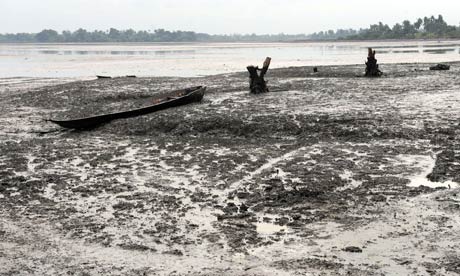
A waterway polluted by spilled crude oil allegedly caused by Shell equipment failure in
Ogoniland. Photograph: Pius Utomi Ekpei/AFP/Getty Images
Nigerian farmers are suing Shell in a Dutch court over environmental damage they say is caused by leaking pipes.
It is the first time a Dutch company has been sued in the Netherlands for alleged environmental mismanagement caused by an overseas subsidiary. The case will be heard at a civil court in The Hague. Royal Dutch Shell argued that it should be heard in Nigeria.
Villagers say the leak in June 2005 fouled fish ponds, farmland and forests in Oruma, in the Niger Delta. They blame corrosion of the pressurised underground pipe for the leak and claim Shell took 12 days to seal it. Shell claims the leak was caused by sabotage.
Radio Control Models - Aviation
Halloween: Cool Ghoul
Flite Test : Cool Ghoul - PROJECTMonster NutBall: Hey Friends, here are the plans to build the Monster NutBall featured in some of our videos including the Cool Ghoul and the most recent Candy Plane episode.
The Cool Ghoul: After watching an episode of Flite Test on YouTube aptly named 'Cool Ghoul' we decided we just HAD to make this plane for Halloween.
The NutBall ... It's what you get when you combine a Pizza Box Flyer with a Smart Dart, the best of both. It's round and it flies like crazy, hence the name.
Notes from ~@~ Listed Below:
Pussy Riot member freed after Moscow court appeal
Sentence for one of Russian punk band Yekaterina Samutsevich suspended but two others remain in prison
Reuters in Moscow, guardian.co.uk, Wednesday 10 October 2012 12.36 BST, Article Source
Pussy Riot member Yekaterina Samutsevich has been freed following an appeal. Photograph: Sergey Ponomarev/APA member of the Russian punk band Pussy Riot has been freed on appeal but prison sentences for two others upheld for a raucous cathedral protest against the president, Vladimir Putin, who said they had got the jail terms they deserved.
A Moscow court confirmed the two-year terms handed down to Nadezhda Tolokonnikova and Maria Alyokhina while suspending the sentence on Yekaterina Samutsevich.
Samutsevich's lawyer told the court that she had not performed the "punk protest" near the altar of Moscow's Christ the Saviour cathedral in February because she had been stopped and led away before it took place.
In emotional statements from a courtroom cage during the appeal hearing, women from the band had earlier said they had not meant to offend the faithful with their actions but criticised the courts and the Kremlin chief.
"Putin is doing everything for the development of civil war in this country," said Tolokonnikova, raising her voice to try to drown out a judge who tried to interrupt her as she began to talk about Putin.
Tolokonnikova, 22, Alyokhina, 24, and Samutsevich, 30, were convicted in August of hooliganism motivated by religious hatred for a "punk prayer" imploring the Virgin Mary to rid Russia of Putin, and sentenced to two years in jail.
The case sparked an international outcry, with western governments and pop star Madonna condemning the sentences as disproportionate, a view not widely shared in Russia where public opinion was shocked by the protest.
In an interview aired on Sunday, Putin defended the sentences: "It is right that they were arrested and it was right that the court took this decision because you cannot undermine the fundamental morals and values to destroy the country".
At the appeal hearing, Tolokonnikova and Alyokhina told the court their protest was purely political.
"We did not want to offend believers," Alyokhina, 24, told the court. "We came to the cathedral to speak out against the merger between spiritual figures and the political elite of our country."
Alyokhina said she did not expect the appeal would succeed, however. "I have lost all hope in our courts," she said.
Defence lawyer Mark Feigin asked the court to reverse the verdict and censure Putin. "No official ... is permitted to interfere with the court," he said angrily.
Relatives and lawyers for the trio complained of political interference in the original trial and said that Putin's weekend comments on the case in the interview marking his 60th birthday had compromised the appeal.
"After Putin's comments, I don't think lawyers can do anything anyway," Samutsevich's father, Stanislav, told Reuters on Tuesday.
The women contend that their protest in the cathedral in central Moscow was an acerbic comment on the close ties between the Kremlin and Russia's dominant church, which considers about two-thirds of the population as its flock.
Russian Orthodox Ppatriarch Kirill had given Putin, then prime minister, unofficial but clear support in his successful campaign for a third presidential term, likening Putin's years in power to a "miracle of God".
Kremlin opponents said the jail terms were part of a clampdown on dissent that has produced restrictive laws and criminal cases against critics of Putin since he began his six-year term in May.
"We are in jail for our political convictions," Alyokhina said. "Even if our sentences are upheld, we will not be silent. Even if we are in Mordovia or Siberia, we will not be silent, no matter how uncomfortable it is for you."
Tolokonnikova also told the court the group was not motivated by religious hatred.
"It's painful for me to hear that I am speaking out against religion. I have no religious hatred and never have," she said.
Sympathy for Pussy Riot is limited in Russia, where Patriarch Kirill has cast the protest as part of a concerted attack meant to undermine traditional Russian values and curb the church's post-Soviet revival.
Parliament is considering legislation stiffening punishment for offending religious feelings and Putin has warned that such offences – against Christians, Muslims or other believers in diverse Russia – could incite violence.
Dmitry Medvedev, the prime minister, said last month that they have already served enough time, while the Russian Orthodox church has said they should repent if they want forgiveness – a request they made clear they found inappropriate.
An opinion poll conducted on between 21 and 24 September by the independent Levada centre found 35% of Russians believe the two-year sentences were appropriate, while 34% said they were too lenient and only 14% said they were excessive.

Native Americans Have Been Fighting Terrorism Since 1492
John Trudell, Crazy Horse
PETITION: NATIONAL HOLIDAY FOR NATIVE AMERICANS
Google's privacy policy:
EU data protection chiefs 'to act within days'
EU data protection commissioners are believed to have determined that pooling of data by Google breaches privacy laws
Charles Arthur, technology editor guardian.co.uk, Monday 8 October 2012 11.10 BST, Article Source
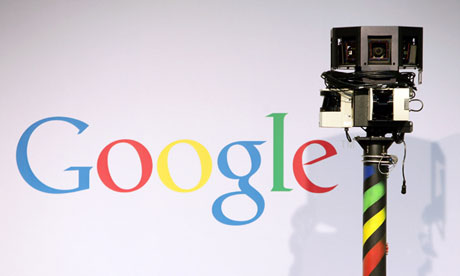
German data protection authorities are considering their response to news that Google
has not destroyed all the data its Street View cars collected when they scanned Wi-Fi
networks in houses and businesses. Photograph: Sean Gallup/Getty Images
Google's unilateral change to its privacy policy in March will come under fire from European data protection commissioners within days, sources say.
The controversial changes, in which Google tied together the previously separate data collected under services including its search engine, YouTube and Google+ were announced in January and implemented two months later. While creating a unified privacy policy across all the services, it also in effect amassed the data into a single location.
That attracted widespread criticism – and now the group of 30 data protection commissioners from across the European Union are believed to have determined that Google has breached EU privacy laws.
Now Google might be required to undo the changes – although Auke Haagsma, a lawyer advising the lobby group Icomp, which is critical of Google's policies, said that would be like trying to "unscramble the egg".
Data protection commissioners in a number of countries have varying powers. The Information Commissioner's Office (ICO) in the UK declined to comment on the decision, but said that generally it can use its powers to force any company that breaks the law in altering its privacy policy to reverse the change. "We can issue an enforcement notice," said a spokesperson.
The internet firm is already being investigated by the European commission's competition arm, which says that the way it orders its search results, uses other sites' content, and controls some elements of advertising is anti-competitive.
The two sides have been locked in negotiations since July. Joaquín Almunia, the EC competition commissioner, warned Google in September that it could face court action if it was not more flexible in the negotiations.
Some German data protection authorities are also considering their response to the news that Google has not destroyed all the data its Street View cars collected when they scanned Wi-Fi networks in houses and businesses adjacent to roads.
The changes to Google's privacy policies had already been described as being possibly in breach of EU law by the justice commissioner, Viviane Reding, in March.
Data protection commissioners, led by the French national agency CNIL, criticised Google at the time for making the change without offering consumers the chance to opt out by remaining with the existing policy. The only choices Google offered users were to move to the new policy, or delete their entire user profile. The CNIL and others wanted them to be offered the option of remaining with the existing segmented profile.
Google said at the time that the changes would simplify the experience of using its services and that it was confident that they respected "all European data protection laws and principles". It said users would benefit because it would be able to tailor search results and advertising more specifically to users.
Google declined to comment.
PIG PETROLEUM POLLUTERS PROFIT PROFUSELY
The High Cost of Gas In California
= What Goes Around Comes Around =
Start Reading by Clicking On this link:
October 4, 2001
Ted Rall Cartoon:
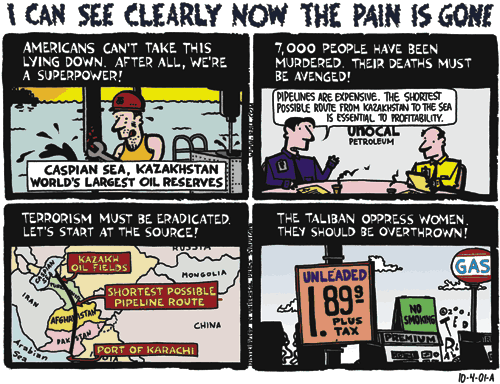
Ted Rall cartoon October 4, 2001: This cartoon was done less than a month after 9/11 and shows a rectangle divided into four smaller rectangles. At the top it says: I CAN SEE CLEARLY NOW THE PAIN IS GONE
The upper section (of each smaller rectangle) has a black background, with white print, and below them there is a cartoon.
1st small rectangle shows a cartoon of an oil man with a wrench working on an offshore oil rig.
The top caption says: AMERICANS CAN'T TAKE THIS LYING DOWN. AFTER ALL, WE'RE A SUPERPOWER!
Below, in the cartoon, it says: CASPIAN SEA, KAZAKHSTAN WORLDS LARGET OIL RESERVES.
2nd rectangle, next to the one above, shows a cartoon of two oil executives talking in a room with UNOCAL Petroleum on the wall.
The top caption says: 7,000 PEOPLE HAVE BEEN MURDERED. THEIR DEATHS MUST BE AVENGED!
Below, in the cartoon, it says: PIPELINES ARE EXPENSIVE. THE SHORTEST POSSIBLE ROUTE FROM KAZAKHSTAN TO THE SEA IS ESSENTIAL TO PROFITABILITY.
3rd rectangle, bottom left, shows a cartoon map with a pipeline running from the Caspian Sea to the Port of Karachi, across several countries the U.S. is currently fighting in.
The top caption says: TERRORISM MUST BE ERADICATED. LET'S START AT THE SOURCE!
Below, in the cartoon, it shows the: SHORTEST POSSIBLE PIPELINE ROUTE
4th rectangle, next to the one above, shows a cartoon of a gas station with a gas price sign.
The top caption says: THE TALIBAN OPPRESS WOMEN. THEY SHOULD BE OVERTHROWN!
In the above cartoon, the gas price sign says:
UNLEADED 1.89 9/10 PLUS TAX
November 19, 2001
There's no denying that this is an oil administration, you can't talk about the career of any George Bush -- father or son -- without talking about oil." - Peter Eisner
September 4, 2002
Plans For Iraq Attack Began On 9/11
CBS News has learned that barely five hours after American Airlines Flight 77 plowed into the Pentagon, Defense Secretary Donald H. Rumsfeld was telling his aides to come up with plans for striking Iraq -- even though there was no evidence linking Saddam Hussein to the attacks.
Anonymous Graphic:
== Blood for Oil ==

We SHELL not EXXONerate Saddam Hussein for his actions. We will MOBIL'ize to meet this threat to vital interests in the Persian GULF until an AMMICOble solution is reached. Our best strategy is BPrepared. Failing that, we ARCOming to kick your ass.
and then there was the following:
Schwarzenegger Met with Enron's Ken Lay Before the California Recall. Schwarzenegger Accused of Involvement in $9B California Swindle with Enron's Ken Lay
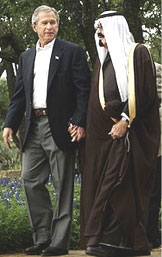
![]()
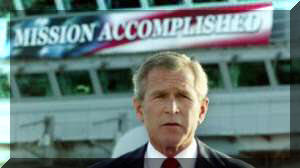
![]()

Dan Bartlett Caught In A Lie:
'No One Ever Said
The War Would Result In Cheaper Gas Prices'By ThinkProgress on Apr 19, 2006 at 5:42 pm
Appearing this afternoon on MSNBC's Hardball, White House Counselor Dan Barlett adamantly denied that anyone in the administration claimed that the Iraq war would lead to lower gas prices. The transcript:
MATTHEWS: [W]e've been struck by higher gas prices. That was another promise made, that this war would help us get cheaper gas --
BARTLETT: I don't think --
MATTHEWS: None of these promises come through.
BARTLETT: That's not correct, Chris. The president or no one else ever said that this war was going to result in cheaper gas prices...
MATTHEWS: Ok, so just to make it official, Dan, no one in the administration has ever said that we would have cheaper gas because of war in Iraq, just to make it official?
BARTLETT: I don't recall anybody ever saying that, Chris.
As Matthews noted later in the broadcast, Laurence Lindsey -- President Bush's senior economic advisor at the time -- argued in 2002 that the Iraq war would increase oil supplies and lower prices. From the Washington Times, 9/19/02:
As for the impact of a war with Iraq, "It depends how the war goes." But he quickly adds that that "Under every plausible scenario, the negative effect will be quite small relative to the economic benefits that would come from a successful prosecution of the war."
"The key issue is oil, and a regime change in Iraq would facilitate an increase in world oil," which would drive down oil prices, giving the U.S. economy an added boost.
Bartlett is a talented spinmeister but facts are stubborn things.
Energy firms' profits per customer rise 733%, says Ofgem
Energy regulator unveils proposals for 'radical reform' of the energy market, as it reveals the net margin for a typical customer has risen from £15 in June to £125 in October
Dan Milmo and Lisa Bachelor, guardian.co.uk, Friday 14 October 2011 09.50 BST, Article history, Article Source

Energy firms are making £125 a year from each dual fuel customer, says Ofgem. Photograph: Graham Turner for the Guardian
Ofgem has revealed that the big six utility companies are making £125 a year out of each of their dual fuel customers. This figure has risen by 733% in just four months.
The energy regulator put simple tariffs and clearer bills at the centre of proposals for "radical reform" of the energy market this morning as it warned a lack of transparency is stifling competition in the market, apparently underlined by a profit margin that has risen from 1.3% on the average bill in June to 9% in October, following a wave of tariff increases.
Ofgem said its plans would make it easier for consumers – currently faced with more than 400 tariffs to choose from – to compare prices. The watchdog will set a fixed standing charge on top of which the companies will have to offer a variable price per unit, making bills clearer and price comparison easier. This means there will be no complicating factors such as discounts, with the only changeable element on a bill the price per unit of gas or electricity.
"So the lower the price the smaller the bill – with no exceptions," Ofgem said.
The regulator also revealed that the average household energy bill now stands at £1,345 a year on a rolling 12-month average, compared with £1,170 in June. In news that will outrage consumer groups who have long argued that energy companies make too much money from cash-strapped customers, Ofgem also revealed that over the same period, the net margin for a typical standard tariff dual fuel customer has risen from £15 a year, as measured in June, to £125 in October.
Yesterday, an undercover investigation by consumer body Which? revealed that the number of energy tariffs available to householders is so vast, and the options so complex, that staff at energy companies have no idea which is the best deal.
Which? called each of the six major energy suppliers 12 times in a week to get advice on the cheapest deal. Despite being asked clearly for the lowest cost option in each case, in nearly a third of the calls the firms failed to offer their cheapest tariff. Staff also gave questionable advice about potential savings, cashback deals and fixed prices.
Alistair Buchanan, Ofgem's chief executive, said a looming £200bn investment drive to green the UK's energy supply would only put further pressure on bills, adding further momentum to the need for reform.
"When consumers face energy bills at around £1,345 they must have complete confidence that this price is set by companies competing in a fully competitive market. At the moment that is not the case," he said.
"That is why a radical break with the past is needed. Ofgem's tariff reforms offer the quickest way to create a market where consumers can have confidence that prices are set by effective competition. Suppliers have told Ofgem they want to restore confidence in the industry and now they have the chance to do so."
Prices have risen sharply in recent months, leading to warnings of rising "fuel poverty" – defined as any household that spends 10% of median income on electricity or gas – amid sub-inflation wage growth and a faltering economic recovery.
Last week, the government announced an industry-funded Warm Home Discount scheme, which offers a £120 rebate off the bills of those considered most vulnerable this winter.
One of the big six firms, Scottish and Southern Energy, reacted to the political furore this week by announcing it would auction all the electricity that it produces on the day-ahead market, breaking a convention that has previously seen all the big utilities generate and distribute their power, known as combining "upstream and downstream" activities, another bugbear for critics.
Ofgem said the simplification of tariffs was the "first of four waves of reform" which would include plans due in November to help business users, and in December decisions on proposals "to break the stranglehold of the big six in the wholesale electricity market".
Britain's energy minister Chris Huhne last month pledged "to get tough with the big six energy companies", while earlier this year Ofgem threatened energy companies with a formal referral to the Competition Commission if they didn't transform their prices and stop confusing customers. It said consumers were being "bamboozled" with the number of different energy tariffs now available. Ed Miliband, the Labour Party leader, has pledged to abolish a "rigged" energy market that has allowed the companies to achieve market "dominance".

Growth of Family Income 1947-2007 - www.ConnectTheDotsUSA.com
Tax cuts were devoured by rising fuel prices and funneled to BIG OIL; leaving one to ask,
Who Is Making A Fortune on Oil & Gas ?

THEY RETURNED
THEY Took Your Jobs
THEY Took Your Homes
THEY Took Your Money
THEY Started Illegal Wars
THEY Destroyed the Economy
THEY Murdered Women & Children
THEY Put Martha Stewart & Tommy Chong In Jail
and... THEY
Held the Teachers Accountable!

This EVIL
good ol' boy network
Brought Disgrace to the United States
with Republican, Democrat, Senate, Congress, Supreme Court Approval,
AND WALK FREE TODAY.
One Can Lead A Horse To Water, But...
Until there is a solution for this, where one solution has been provided, Nobody will bring Peace to Our Times, feed the hungry, care for the sick, and bake apple pie better than Mom. (otoh) If None of the Above was on voter ballots, it would be a huge step towards recovering U.S. political control, and Nobody gets it.
Steven Leech - Writer/Poet/D.J.
The Wedgehorn Manifesto is a call to action, a demand, an impassioned plea for the recognition, respect, and support of Delaware's artistic cultural past, present and future. - Pat gibbs, columnist, The Wilmington SPECTATOR
The Wedgehorn Manifesto-3
A Cultural Treatise from the Underground by Steven Leech
WedgehornManifesto-3.pdf
Notes from ~@~ Listed Below:
SPACE PATROL TV SHOW / EPISODE - 1953
CAPTAIN MIDNIGHT TV SHOW / EPISODE - 1955Life after cancer
For many patients, remission of the disease is just the first step in a long and emotionally draining process of recovery
Lucy Atkins, The Guardian, Sunday 7 October 2012 20.00 BST, Article Source
Charities such as Maggie’s provide support for recovering patients.Cancer news usually involves unremittingly grim stories about carcinogens or rising cancer rates. But recently there was something more positive. A Cancer Research UK report shows that deaths are "set to fall dramatically" by 2030. The 17% drop will be the result of major improvements in diagnosis, treatment and fewer people smoking. Many more of us can expect to survive cancer.
This is marvellous news but unfortunately it's not the full story. "It is not that a magic wand has been waved and they are all cured," says Ciarán Devane, chief executive of Macmillan Cancer Support. "It actually means many people will be living longer with the disease. The impact of cancer does not suddenly stop when treatment is over. Many cancer patients have to deal with the physical and emotional effects of their cancer for years afterwards."
Christina Buffham, 32, from Staines, was diagnosed with breast cancer when her son, Jack, was only four months old. During her maternity leave from British Airways she had a mastectomy followed by gruelling chemotherapy. "I got the all-clear on Jack's first birthday," she says, "and I thought, 'Life's going to be brilliant now.' I was euphoric. But when all that dies down, it hits you: your body still isn't right and you are terrified that the cancer will come back."
This is a common reaction. "Rates of depression and anxiety are very high when treatment ends," says Dr Michelle Kohn, director of Living Well, a programme that offers emotional and practical support to cancer patients at Leaders in Oncology Care, a private London-based clinic. "Other emotional issues, such as low self-esteem, anger, stress or sleep problems are also widespread."
On top of this, cancer survivors are often battling with physical and practical challenges, anything from huge financial losses, to the side effects of medication, profound fatigue, a confused-feeling known as "chemo brain", or lymphoedima (swelling). Their loved ones, meanwhile, might be increasingly baffled as to why they can't bounce back and make the most of life. "People suffer for years, often in silence, without any real support," says Kohn. "Life after cancer can actually be very difficult and lonely."
It does not help, says Devane, that, "the current system is woefully inadequate at supporting the changing nature of cancer survivors". In the United States, most major cancer units have survivorship programmes where teams of psychologists, nurses, and other specialists offer ongoing information, advice and emotional support to patients when treatment ends. This, of course, is funded by health insurance. In contrast, NHS post-treatment psychological or practical services are limited, to say the least.
The National Cancer Survivorship Initiative (NCSI), a partnership between the Department of Health and Macmillan, was launched in 2008 to help improve the situation but it has a massive job on its hands. According to NCSI research, 60% of cancer survivors have unmet physical or psychological needs; over 33% have problems with close relationships, careers, or have difficulty performing household duties; over 90% have suffered financial losses. Waving these people off with a six-month followup appointment, is simply not working.
The NCSI is launching a range of programmes that take a more holistic approach to the needs of cancer survivors, for example encouraging physical activity, or helping with issues including work and finance. "It is essential the NHS now implements these solutions," says Devane. But there is a very long way to go.
Other cancer charities, in smaller ways, are also trying to plug the gaping hole in post-cancer care. The charity Maggie's runs a free six-week programme called "Where Now?" that aims to help people adjust to life after treatment ends.
There are, in fact, many highly effective ways to cope with tricky post-treatment issues. But without expert guidance, few people know where to begin. "The fear that cancer will come back again is huge for me," says Christina. "It's impossible to ignore. There are reminders everywhere, on TV, the newspaper, the internet. Other people also say things without realising the impact they're having – more than once I've had people tell me about someone they know whose cancer came back, spread and killed them."
In fact, Christina's cancer has already returned, twice. And she has also had to contend with complications from breast reconstructions (so far she has had four reconstructive surgeries). She is now cancer-free and "determined to enjoy life to the full". But still, whenever she feels unwell the fear sets in and – despite a supportive family – she says that she can feel very alone.
"My GP is brilliant," she explains, "But there's only so much she can do. The consultants are absolutely inundated, and understandably, since I don't have cancer, I can't be their top priority. But I also know that all three times my cancer was dismissed at first by doctors, so it can be terrifying, if I feel an unusual symptom, to be told to wait and see."
None of this must dampen the brilliant news about falling death rates. But there is a clear message behind the headlines, and one that must not be ignored: NHS post-cancer treatment services need to change dramatically.
• Frances Goodhart, of The Cancer Survivor's Companion: Practical ways to cope with your feelings after cancer (Piatkus).

Alerts + Notes from ~@~ Listed Below:
Neil Young's Waging Heavy Peace, read by Keith Carradine
Listen to an exclusive extract from Neil Young's new memoir
Waging Heavy Peace, read by actor Keith Carradine [Flash]by Ranjit Dhaliwal, guardian.co.uk, Wednesday 3 October 2012 16.14 BST, Article Source
The action picks up in 1970, when Young visits the burgeoning music scene in San Francisco and encounters characters like the Jefferson Airplane's Paul Kantner. Following the Kent State shootings – when four college students were shot dead by the Ohio National Guard – Crosby, Stills, Nash & Young record Young's classic anthem Ohio. On Thursday, read a longer extract from the book, plus an interview with Neil Young.
From Waging Heavy Peace. Excerpted by arrangement with Penguin Audio, a member of Penguin Group (USA) Inc. © 2012 Neil Young (P) 2012 Penguin Audio.
Is that Steve Jobs on the back of a Chinese pickup truck?
By Eric Pfeiffer, Yahoo! News, The Sideshow, Article Source
What exactly is in this image that appears to show late Apple CEO Steve Jobs? (Weibo.com)A strange photograph that appears to show the late Apple CEO Steve Jobs standing in the back of a pickup truck, striking a pose in his signature black turtleneck sweater, is making the rounds online in China.
The picture was reportedly taken on September 26 in the city of Xi'an. However, it's still unclear what exactly it is we're seeing in the image. Is it a cardboard cutout of Jobs? Or maybe it's a cleverly doctored photograph?
Kotaku speculates that the image looks strikingly similar to a wax figure of Jobs that was recently snapped in China.
During an Ocotober 2011 "60 Minutes" appearance, Jobs biographer Walter Issacson discussed Jobs' views on the afterlife:
"I remember sitting in his backyard in his garden one day and he started talking about God. He said, 'Sometimes I believe in God, sometimes I don't. I think it's 50-50 maybe. But ever since I've had cancer, I've been thinking about it more. And I find myself believing a bit more. I kind of--maybe it's 'cause I want to believe in an afterlife. That when you die, it doesn't just all disappear. The wisdom you've accumulated. Somehow it lives on.' Then he paused for a second and he said, 'Yeah, but sometimes I think it's just like an on-off switch. Click and you're gone.' He paused again and he said, 'And that's why I don't like putting on-off switches on Apple devices.'"
What do you think? Apple is the largest and arguably most powerful corporation on Earth today. Could its late founder be transitioning to a new calling and joining the ranks of other supposedly spotted mythological figures?
In August, the Abbot of a Thai Buddhist temple speculated that Jobs was existing in the afterlife as a midlevel angel.
Please miss, What's a Pleb? = A member of a despised social group. Like, erm, politicians.
Ros Asquith, guardian.co.uk, Monday 1 October 2012 18.00 BST, Cartoon SourceThe End of Men:
And the Rise of Women by Hanna Rosin - reviewWomen have taken over, apparently. If only, argues Mary Beard
Mary Beard, The Guardian, Wednesday 3 October 2012 08.00 BST, Article Source
Females rule? 'This will come as a surprise to most women on the planet'. Photograph: Herman Agopian/GettyThe myth of matriarchy is one of patriarchy's oldest inventions. Those stories of primitive warrior queens, buxom mother goddesses and tribes of Amazons are no evidence at all that women did once rule the world. As most anthropologists have recognised for decades, these are cautionary tales invented by men to justify their own dominance. The important point about matriarchy in most of these myths is that the women rulers made a terrible mess of things or they imposed regimes of such terror (who would like to be ruled by the Amazons, after all?) that there was no choice but to overthrow them. And that, according to the logic of the stories, is why we now have patriarchy.
Most of the literary fantasies about women in charge, ancient or modern, make the same point. In Aristophanes' 5th-century BC comedy, Assemblywomen, for example, women have taken charge of Athens, and bring in a whole series of hare-brained pseudo-egalitarian measures – including the requirement that men had to sleep with ugly old women before pretty young ones. It would have been enough to reconcile the average Athenian man to any kind of male government, no matter how incompetent.
Hanna Rosin's The End of Men is yet another version of the old story, but with a twist: she claims that we are now actually living under a matriarchy, or very soon will be. This, I imagine, will come as something of a surprise to most women on the planet. But Rosin's book teems with examples of the decline of modern man and the rise of woman in terms of money, education, employment and power. Men, she argues, have been the major victims of the recession, failing to adapt to the decline in manufacturing industries and to the challenges of post-modernity. If you believe her, vast numbers of the male American working class have been transformed from proud breadwinners to unemployable couch potatoes. Their womenfolk, on the other hand, have seized the opportunities offered by the economic changes of the last few years; they have retrained, requalified and taken the driving seat.
In 2009, she points out, American women outnumbered men in the workforce for the first time. They now outnumber men on degree courses by a ratio of three to two, and are even beginning to "crowd out men" on science and engineering courses. More and more families depend on the woman as the main breadwinner (almost 64% in Washington DC). And of the 15 most expanding job categories in the US, 12 are now dominated by women. "Indeed," she writes, "the US economy is in some ways becoming a kind of travelling sisterhood." And it is not just in North America. Examples from all over the globe – the first openly lesbian head of state in Iceland, the 80% of college-educated Brazilian women who aspire to top jobs, the female majority in the Rwandan parliament – make the new matriarchy seem more or less a fait accompli.
I don't know exactly what to make of all these facts and figures, but I strongly suspect that they have been rather carefully selected and presented. Rosin herself admits that the dominance of female breadwinners in Washington DC "is largely because the city has so many poor single mothers". It is also the case that the majority of those expanding job categories she refers to are in the caring (ie relatively low-paid) professions, and it is these that underpin the "travelling sisterhood" that supposedly defines the US economy; or, as she puts it, "professional women leave home and enter the work force, creating domestic jobs for other women to fill" (not "sisterhood" in the traditional feminist sense then). Besides, she has very little to say about the fact stressed in most studies of gender in the US workforce: namely that women's pay still lags far behind that of men, across the board, with women's salaries averaging 20% less than those of their male counterparts. If this is a budding matriarchy it is a surprisingly poorly paid one.
The headline thesis of The End of Men is, of course, eyecatching (and, according to the book's optimistic publicity material, the title has already "entered the lexicon" as dramatically as The Second Sex or The Feminine Mystique). But, on a closer reading, it is not entirely clear how far Rosin believes it, or at least how far she thinks that women are the straightforward beneficiaries of the power-shifts she detects.
At one point, she writes of visiting a community college in Kansas City and getting into an elevator with a young woman still dressed in her medical assistant's scrubs – who promptly "fell asleep between the first and fourth floors, so tired was she from studying, working, and taking care of her kids by herself". This sounds like the usual downside of women's careers for 100 years or so: "getting on" requires superhuman energy and stamina.
That is certainly the message of several of the case studies in which she explores a new style of male-female domestic partnership that goes hand in hand with greater female power. She calls these "see-saw marriages", in which men and women divide the responsibilities differently at different periods of the relationship – with sometimes the man, sometimes the woman taking on more of the domestic, or more of the money-raising duties. It looks fine on paper, but again, it turns out to be the same old story of two jobs not one (wage earner and domestic goddess) for the women, even the relatively affluent.
Take the unfortunate Sarah, a successful lawyer married to a "mediocre house dude" (his words) called Steve, who stays at home to mind the baby. Sarah's daily routine includes making the family's breakfast before she leaves for work and washing the diapers when she gets back in the evening. Steve defines his domestic tasks as "smearage containment", which means putting the dirty diapers in the sink, but not actually washing them. Sarah, needless to say, is her own worst enemy in refusing to use disposables. So much for the new matriarchy.
It is perhaps to the credit of Rosin (and of her honesty) that if you did not know the title of the book you might very likely imagine that whole sections of it had been written to support precisely the opposite argument. One chapter, entitled "The Top", is a fairly standard discussion of how women still haven't made it there, or not at any rate to the very pinnacle. She does stress a few exceptions. "The job of Secretary of State has been virtually reserved for a woman," she insists (though I'm not sure that three out of the last eight really suggests female dominance). Or: "The number of female heads of state, although still small, has suddenly doubled in the last several years" (is that from four to eight, or five to ten?).
But for the most part she puzzles, as many have before, about women's absence from the boardroom, and their apparent unwillingness to demand the pay rises that their male counterparts achieve. "Women," she explains, "carry psychological baggage into the workplace: a lingering ambivalence about their ambition, a queasiness about self-promotion, a duty to family that they can't or won't offload on to their husbands, etc etc."
So how does all that fit with the arguments about the new matriarchy? All Rosin can offer is the old gradualist answer. "The world does not flip upside down overnight. Men have been in charge for about forty thousand years, and women have started edging them for about forty. So of course there are still obstacles at the top."
It turns out then that we haven't actually put a new matriarchy in place. This version is as mythical as any other – and Rosin, to give her her due, probably knows it.
• Mary Beard's Pompeii: the Life of a Roman Town is published by Profile
British soldiers are dying in Afghanistan
to win the war of Whitehall
Only one battle matters to the Ministry of Defence – the battle for resources. In this the Taliban is not an enemy, but an ally
Simon Jenkins, The Guardian, Tuesday 2 October 2012 20.30 BST, Article Source
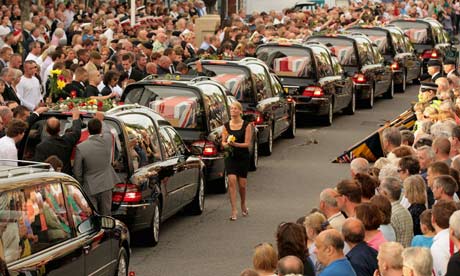
A cortege carrying the bodies of British soldiers killed in Afghanistan passes through Wootton Bassett in 2010. Photograph: Matt Cardy/Getty Images
Next week Nato defence ministers meet in Brussels, reportedly to start planning an Afghan army "retraining mission" next year. Start planning? What have they been doing for over a decade? When will spades be called spades and retreats retreats?
Afghanistan has become another war of the Spanish succession, its cause long forgotten by the opponents but an unending parade of pride, money, heroism and national prestige. It is no longer a war of retribution for 9/11, no longer a war of democratic nation building. It is merely a place where soldiers are sent by politicians to pretend to win, even as they die.
The one straw at which ministers and generals will grasp is that as long as the war lasts, it helps them lobby for money. Ever since Nato lost its reason for existing, its task has been to find a purpose. It has dragged out the insane Afghan conflict for 11 years. Why stop now? In the one battle that matters to a modern army – the battle for resources – the Taliban is not an enemy but an ally.
What do officials say nowadays to the relatives of the 433 British and 2,000 American who have died fighting in Afghanistan. Do they say they have avenged the dead of 9/11, taught the Taliban a lesson, "sent a message" to militant Islam, helped rebuild a poor country? They cannot surely be repeating Gordon Brown's line, that their deaths are making Britain's streets safer. London now has to be patrolled by armed policemen, and a billion pounds spent protecting the Olympics.
The truth is that British troops are dying in Afghanistan because no British government has the guts to admit they are there to no purpose. Military lobbyists shelter behind the "bravery of our boys" to sustain defence spending. No party dares question the war or its objective, for fear of demeaning heroism. The war is not mentioned at party conferences. Money is poured into drone bombing, despite its manifest counter-productivity. The coalition claims to be "training" a 350,000-strong local army and police force, but knows them to be unreliable, a new Taliban in the making.
There is evidence that Philip Hammond, the least gullible of defence secretaries, is starting to cleanse the Augean stables of defence spending. Trident is being mothballed. Regiments are being disbanded. Hammond is demanding the army get below 100,000 soldiers, given that after Afghanistan it will have little to do beyond changing the guard. The navy and air force crave another Libya, where they "bravely" spent half a billion pounds replacing a nutcase with a bunch of bandits. Their reckless procurements are at last being addressed.
Whether Hammond survives long enough to do more than scrape the surface of his £37bn budget has yet to be seen. He is still buying jet fighters, destroyers and "hunter-killer" submarines, designed by military lunatics to fight Hitler. In 2010 Cameron was bamboozled by the defence lobby into the nonsense that it would cost more to cancel aircraft carriers than to build them. He then found adapting F-35 fighters to use them (one day) had tripled in cost.
These are not sums attributable to the vagaries of war. They are normal day-to-day spending, as on schools and hospitals. If any other government department, let alone a council or private company, behaved like the MoD it would be bankrupted and replaced, its officials probably up before the Old Bailey.
Senior politicians are putty in the hands of military posturing and hard-graft lobbying. That is how Britain has come to spend more on defence than Germany, Japan, India and even Russia. The MoD has seen 250 senior staff leave to work for defence contractors in a single year, without batting an eyelid. Defence spending is one vast job-creation scheme. It has not made Britons safer, merely some Britons richer.
Each attempt to cancel or cut a programme is greeted with howls from the lobbyists. A marine general, Julian Thompson, popped up recently to say that "the Falklands war would be lost today", so deep are the cuts. Admirals deplore the "hollowed out navy, holed below the waterline". Dan Jarvis, an ex-paratrooper and Labour MP, wails to the Guardian that army cuts damage "our ability to leverage influence in the world". Spending on defence is like the Olympics, a matter not of security but of global leverage and influence.
Afghanistan policy no longer uses the word victory. It needs only to engineer a future that preserves Nato dignity and saves its generals from humiliation, however long it takes. Today's wars of intervention are like medieval conflicts, causes so lofty that mere mortals cannot see the point. They are an outlet for heroism, a reason for lucrative taxation and, with luck, a source of glory.
I have never read a coherent explanation, in simple English, of why Britain still spends money on defence, long after the cold war is over. If anyone were to emerge to pose a conventional and existential threat to the British state, which is wildly unlikely, we would have time to rearm. As for our current obsession with fighting wars in small countries, the future is said to lie with hi-tech cyber-weapons, not lumbering armies and manned weapon platforms.
Nothing illustrates the thinness of the case for military spending so much as the airy language nowadays used to justify it. We no longer need to stop invasion. We merely need to "punch above our weight" and "stand tall in the world". This is fatuous. An attaché swaggering at an embassy drinks party is not influence. China and Germany are proving that influence in the modern world comes from working hard, from a tight budget and a sound economy. Britain has neither.
When public money is spent to no purpose it is usually wasted. Defence money merely encourages government to indulge in one stupid war after another, killing Britons and foreigners in conflicts we are never going to win. Rory Stewart's recent television history of Afghan disasters was irrefutable.
This week another British soldier is likely to die in Afghanistan. His death will be greeted with heroic rhetoric, intended to imply that his sacrifice is keeping this country safe. That will be a lie. Britain is less safe for fighting this war. Soldiers are dying to defend a Whitehall budget, enrich a commercial lobby and protect a politician's back. They are wretched reasons.
Keith Lampe - Co-Founder of YIPPIE and Progressive Activist Groups
9/11, The Sequel ???
USS Liberty - Rethinking 9/11 - Origin of The Plan - They/Them - The Ghost of Tom Joad
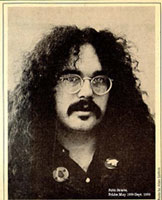
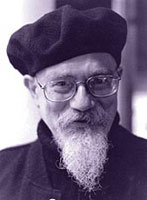

Happy Birthday John Sinclair & Mohandas Karamchand Gandhi
A rightwing insurrection is usurping our democracy
For 30 years big business, neoliberal thinktanks and the media have colluded to capture our political system. They're winning
George Monbiot, The Guardian, Monday 1 October 2012 20.30 BST, Article Source
After contemplating a military coup Sir James Goldsmith went on to form the
Referendum party, slogan: Let the People Decide. Photograph: Jacqueline Arzt/APTo subvert means to turn from below. We need a new word, which means to turn from above. The primary threat to the democratic state and its functions comes not from mob rule or leftwing insurrection, but from the very rich and the corporations they run.
These forces have refined their assault on democratic governance. There is no need – as Sir James Goldsmith, John Aspinall, Lord Lucan and others did in the 1970s – to discuss the possibility of launching a military coup against the British government: the plutocrats have other means of turning it.
Over the last few years I have been trying better to understand how the demands of big business and the very rich are projected into policymaking, and I have come to see the neoliberal thinktanks as central to this process. These are the groups which claim to champion the free market but whose proposals often look like a prescription for corporate power.
David Frum, formerly a fellow of one of these thinktanks – the American Enterprise Institute – argues that they "increasingly function as public relations agencies". But in this case, we don't know who the clients are. As the corporate lobbyist Jeff Judson enthuses, they are "virtually immune to retribution ... the identity of donors to thinktanks is protected from involuntary disclosure". A consultant who worked for the billionaire Koch brothers claims that they see the funding of thinktanks "as a way to get things done without getting dirty themselves".
This much I knew, but over recent days I've learned a lot more. In Think Tank: the story of the Adam Smith Institute, the institute's founder, Madsen Pirie, provides an unintentional but invaluable guide to how power in Britain really works.
Soon after it was founded (in 1977), the institute approached "all the top companies". About 20 of them responded by sending cheques. Its most enthusiastic supporter was the coup plotter James Goldsmith, one of the most unscrupulous asset strippers of that time. Before making one of his donations, Pirie writes, "he listened carefully as we outlined the project, his eyes twinkling at the audacity and scale of it. Then he had his secretary hand us a cheque for £12,000 as we left".
From the beginning, senior journalists on the Telegraph, the Times and the Daily Mail volunteered their services. Every Saturday, in a wine bar called the Cork and Bottle, Margaret Thatcher's researchers and leader writers and columnists from the Times and Telegraph met staff from the Adam Smith Institute and the Institute of Economic Affairs. Over lunch, they "planned strategy for the week ahead". These meetings would "co-ordinate our activities to make us more effective collectively". The journalists would then turn the institute's proposals into leader columns while the researchers buttonholed shadow ministers.
Soon, Pirie says, the Mail began running a supportive article on the leader page every time the Adam Smith Institute published something. The paper's then editor, David English, oversaw these articles himself, and helped the institute to refine its arguments.
As Pirie's history progresses, all references to funding cease. Apart from tickets donated by British Airways, no sponsors are named beyond the early 1980s. While the institute claims to campaign on behalf of "the open society", it is secretive and unaccountable. Today it flatly refuses to say who funds it.
Pirie describes how his group devised and refined many of the headline policies implemented by Thatcher and John Major. He claims (and produces plenty of evidence to support it) either full or partial credit for the privatisation of the railways and other industries, for the contracting-out of public services to private companies, for the poll tax, the sale of council houses, the internal markets in education and health, the establishment of private prisons, GP fundholding and commissioning and, later, for George Osborne's tax policies.
Pirie also wrote the manifesto of the neoliberal wing of Thatcher's government, No Turning Back. Officially, the authors of the document – which was published by the party – were MPs such as Michael Forsyth, Peter Lilley and Michael Portillo. "Nowhere was there any mention of, or connection to, myself or the Adam Smith Institute. They paid me my £1,000 and we were all happy." Pirie's report became the central charter of the doctrine we now call Thatcherism, whose praetorian guard called itself the No Turning Back group.
Today's parliamentary equivalent is the Free Enterprise Group. Five of its members have just published a similar manifesto, Britannia Unchained. Echoing the narrative developed by the neoliberal thinktanks, they blame welfare payments and the mindset of the poor for the UK's appalling record on social mobility, suggest the need for much greater cuts and hint that the answer is the comprehensive demolition of the welfare system. It is subtler than No Turning Back. There are fewer of the direct demands and terrifying plans: these movements have learned something in the past 30 years.
It is hard to think how their manifesto could have been better tailored to corporate interests. As if to reinforce the point, the cover carries a quote from Sir Terry Leahy, until recently the chief executive of Tesco: "The path is clear. We have to be brave enough to take it."
Once more the press has taken up the call. In the approach to publication, the Telegraph commissioned a series of articles called Britain Unleashed, promoting the same dreary agenda of less tax for the rich, less help for the poor and less regulation for business. Another article in the same paper, published a fortnight ago by its head of personal finance Ian Cowie, proposes that there be no representation without taxation. People who don't pay enough income tax shouldn't be allowed to vote.
I see these people as rightwing vanguardists, mobilising first to break and then to capture a political system that is meant to belong to all of us. Like Marxist insurrectionaries, they often talk about smashing things, about "creative destruction", about the breaking of chains and the slipping of leashes. But in this case they appear to be trying to free the rich from the constraints of democracy. And at the moment they are winning.
Twitter: @GeorgeMonbiot
A fully referenced version of this article can be found at www.monbiot.com
Mike Wilhelm - Charlatans, Flamin' Groovies, Loose Gravel, and more
Mike Wilhelm & Hired Guns - Louie Louie live at the WingSingle cam vid by Ed Chatham, www.bebopvideos.com. Original song by Richard Berry & the Pharaohs, 1958. A fresh take by Mike Wilhelm, guitar & vocal; Gary Bouley, guitar; Paul McCandless, saxes; Jamie Webber, bass, Colin "The Kid" Holmes, drums. Live at the Blue Wing Saloon, Upper Lake, CA on Sept. 17, 2012.
Autumn Fenders - Ralph Davis
Speedway Meadows 1969, Golden Gate Park, San Francisco, CA, Photography by Ralph DavisHow I came face to face with my punk past
Terry Macalister is the energy editor of the Guardian. But when he took his son to an exhibition, he was shocked to see himself – on the cover of a punk fanzine from 35 years ago
Posted by Terry Macalister, Sunday 30 September 2012 22.26 BST, The Guardian, Article Source
Terry Macalister in his punk heyday - and today. Photograph: guardian.co.ukYou don't expect to walk in to the Hayward Gallery and come face to face with yourself. Especially not if the person glaring out at you is a punk rocker from 35 years ago. It reminded me that I have not always been a slightly grumpy energy editor. At one time I was an ill-tempered music writer who produced a fanzine – called Bored Stiff – with a couple of mates.
I had taken my son to an exhibition of punk graphics, Someday All The Adults Will Die!, on London's South Bank, because he had just opted to do art A-level. He liked the show in that take-it-or-leave-it teenage way, while being incredulous that anyone would put their own image on the front page of a magazine. "Even Rupert Murdoch doesn't do that," he sneered.
But I was sent spinning into a reverie of images from Crass, Burnt Offering and Kill Your Pet Puppy. When I got home I immediately tapped into Facebook the name of my co-publisher Kevin, whom I had lost contact with three decades ago. There was his picture: same spiky hair, national health specs and a strange smile. He told me he no longer does art or music but runs a wine shop in Massachusetts.
I was then on to Samuel, with whom I traipsed to endless London gigs at the Roxy, Vortex and Camden Ballroom and went further afield with to see the Sex Pistols at the Middlesbrough Rock Garden. We had kept in sporadic touch as he traded in his plastic bondage pants for a City pinstripe. Martin works on backroom computers for one of those monumental banks that recently wrecked the economy. But he does that for the money and still gets his pleasure from printing up pictures, playing guitar and making clothes.
Along with the music and the politics – or at least attitude – the clothes were definitely part of it: going up to the Vivienne Westwood and Malcolm McLaren-run Seditionaries shop on the King's Road on a Saturday afternoon. But even then the gear was expensive – and I was unemployed. My attempts to make it as a drummer failed, first with Holloway-based Zero Zero, and then at one disastrous gig with acid punk outfit Moses and the Tablets.
I thought I had at least sorted out the pay thing when I landed a job as assistant store keeper in the fancy linen department of John Lewis on Oxford Street (not far from the Vortex). But I was cruelly ousted. Apparently I could not get on with the house rules about only female staff wearing earings.
I realised I might need to become a "proper" journalist – even if I couldn't get my mug easily on the front page.
Missing BBS Files - Some of the first Bulletin Board Systems in the United States
Curtis Spangler - The CommuniTree's First FairwitnessLet's look at some of the earliest electronic virtual communities. This kinship chart shows the origins of the first computer bulletin boards (BBSs) that supported social interaction. Prior to this moment, BBSs messages were organized by alphabetical order, or by date. BBSs were metaphors for physical bulletin boards... objects for the exchange of simple messages, not conversations. Now, in 1978 a group of people in Northern California designed a BBS that used message attachment protocols that facilitated conversations. As a metaphor for this structure they used a tree, firstly because it was based on a principle of computer science called binary tree protocol, and secondly because Northern California near Silicon Valley was a land of hot tubs, Eastern mysticism, and computer hackers, and the organicity that the word "tree" suggested was important to those hackers' worldview.
The story of the life and death of the first CommuniTree tells us how and why the later virtual community systems were designed. The original CommuniTree was designed with the idea that the community it facilitated would be completely free. Anyone could enter any sort of message. In fact, censorship was completely prohibited at the level of the code, of the Tree's program. It worked this way: First, the system operator was prevented from reading messages as they arrived. Second, messages were hard to remove once they were entered. Third, anything could be entered into the system, including so-called control characters, which are not part of the standard alphanumeric set and which can be used to control the operation of the host computer. Lastly, to make sure that no system operator could tamper with the system, the code was written in language called Forth, and not documented. Now Forth is a religion unto itself, and if you know anything about Forth you recognize that this makes the system a total black box -- it's impossible to know anything about how the code works.
CommuniTree went online in 1978. The kinds of conversations they had in there were of a high intellectual and spiritual character. They talked about new philosophies and new religions for post-Enlightenment humanity, the first time such conversations had taken place online.
Now, at the same moment Apple Computer had reached an agreement with the U. S. Government that in return for a tax break, Apple put computers into primary and secondary schools in the U.S., and some of those computers had modems. This meant that quite suddenly a lot of kids could get online. At first both boys and girls had access, but the boys quickly elbowed the girls out of the way -- high tech was men's work. The boys quickly found out CommuniTree's phone number and logged on. They were clearly unimpressed with the high intellectual level of the discourse on CommuniTree, and they expressed their dissatisfaction in ways that were appropriate to their age and linguistic abilities. Now, the hardware of the Tree was the best that Apple had to offer in 1978, it had two floppy disk drives with a combined total of 300 kilobytes of storage. At the time, the folks who designed the Tree said "300K -- we can go on forever. We'll never fill this up." A common BBS today would have at least 100 megabytes of storage, many orders of magnitude greater than the Tree. So it didn't take long for the kids to fill every byte of disk space with every word they could think of that meant shitting or fucking, and then they'd add control characters on top of that, characters that could mess with the program or stop the floppy drives. The sysops couldn't see the messages arriving and couldn't remove them afterward. The Tree was doomed.
One of the participants in the Tree discourse said "Well, the barbarian hordes mowed us down." And the people who were on the Tree ran away, just like the population of a village during a sack. It was a kind of scattering of the tribes. Some of those people went off and designed BBSs of their own that had built into them the elements of control and surveillance that appeared to be necessary to ensure the BBS's survival in a real world that included roaming barbarians. That kind of surveillance and control continues to the present day, built right into the software; we don't think about it much any more. And that's how, back at the beginning of virtual time, the first virtual community left the Magic Garden and entered the "real" virtual world in which good had to find ways to coexist with evil.
Source: http://www.flyingsnail.com/missingbbs/CommuniTree.html
Radio Control Models - Aviation
Flying Bike
Amestizo - BLOG + NEW: http://amestizo.bigcartel.com/
Jay Thomas on Letterman.2009.12.23 - The 'Lone Ranger' Story
Gomma TV - Punk TV Italy
Hi Curtis,
How's it going? Do you know the story of this guy in Italy?
www.gomma.tv - solo networking, niente a che vedere col modello televisivo
My Open Source Cure
Cura open source per un tumore: appello digitale di Salvatore Iaconesi
Salvatore Iaconesi è un esperto di tecnologia, un artista, una figura polivalente con un curriculum ricco e vario. Recentemente, ha scoperto di avere un tumore al cervello. I risultati degli esami gli sono stati però consegnati in un formato chiuso, proprietario. Salvatore li ha "craccati" e resi disponibili per il download a tutti, con un'idea di condivisione e ricerca di aiuto allo stesso tempo. Salvatore chiama la sua idea "Cura Open Source", e scrive: "Ieri sono andato a ritirare la mia cartella clinica digitale: devo farla vedere a molti dottori. Purtroppo era in formato chiuso e proprietario e, quindi, non potevo aprirla né con il mio computer, né potevo mandarla in quel formato a tutti coloro che avrebbero potuto salvarmi la vita. L'ho craccata.
L'ho aperta e ho trasformato i suoi contenuti in formati aperti, in modo da poterli condividere con tutti. Solo oggi sono già riuscito a condividere i dati sul mio stato di salute (sul mio tumore al cervello) con 3 dottori. 2 mi hanno già risposto. Sono riuscito a farlo solo perchè i dati erano in formato aperto e accessibile: loro hanno potuto aprire i file dal loro computer, dal loro tablet. Mi hanno potuto rispondere anche da casa. Progressivamente, renderò disponibili tutte le risposte che riceverò, sempre in formati aperti, così che chiunque abbia il mio stesso male possa beneficiare delle soluzioni che ho trovato". L'invito si conclude con una richiesta di collaborazione per chiunque sia interessato: "Ci sono cure per il corpo, per lo spirito, per la comunicazione. Artisti, designer, hacker, scienziati, dottori, fotografi, videomaker, musicisti, scrittori. Tutti possono darmi una cura", scrive Iaconesi. "Prendete le informazioni sul mio male, se ne avete voglia, e datemi una cura: fateci un video, un'opera d'arte, una mappa, un testo, una poesia, un gioco, oppure provate a capire come risolvere il mio problema di salute" (t.t.)
Salvatore Iaconesi's Video: My Open Source Cure
I have a brain cancer.
I converted my digital medical records into open, accessible formats, turning them into a very personal form of Open Data.
This data is available at http://www.artisopensource.net/cure
Artists, scientists, doctors, designers, hackers are all invited to send me their cure.
In different cultures the word CURE means different things, referring to the body, the soul or to society.
Send me your cure at: info@artisopensource.net and it will be published on the website, so that anyone (maybe someone with my same disease) will be able to benefit from it.
Rainbow Puddle - Stellar Light Shows
Burning Man From Above
Beautiful World by Devo
The American Dream by George Carlin

Nobody Brought Peace To Our Times
"None of the Above" Should Be On Voter Ballots
Oh, I hope that I see you again I never even caught your name As you looked through my window pane -- So I'm writing this message today I'm thinking that you'll have a way Of hearing the notes in my tune -- Where are you going? Where have you been? I can imagine other worlds you have seen -- Beautiful faces and music so serene -- So I do hope I see you again My universal citizen You went as quickly as you came -- You know the power Your love is right You have good reason To stay out of sight -- But break our illusions and help us Be the light - Listen -- Message by Michael Pinder
Freedom of expression and freedom of speech aren't really important unless they're heard...It's hard for me to stay silent when I keep hearing that peace is only attainable through war. And there's nothing more scary than watching ignorance in action. So I dedicated this Emmy to all the people who feel compelled to speak out and not afraid to speak to power and won't shut up and refuse to be silenced. - Tommy Smothers

The man whispered, "God, speak to me" and a meadowlark sang. But the man did not hear. So the man yelled "God, speak to me" and the thunder rolled across the sky. But the man did not listen. The man looked around and said, "God let me see you" and a star shined brightly. But the man did not notice. And the man shouted, "God show me a miracle" and a life was born. But the man did not know. So the man cried out in despair, "Touch me God, and let me know you are there" Whereupon God reached down and touched the man. But the man brushed the butterfly away and walked on.

Don't miss out on a blessing because it isn't packaged the way you expect.
